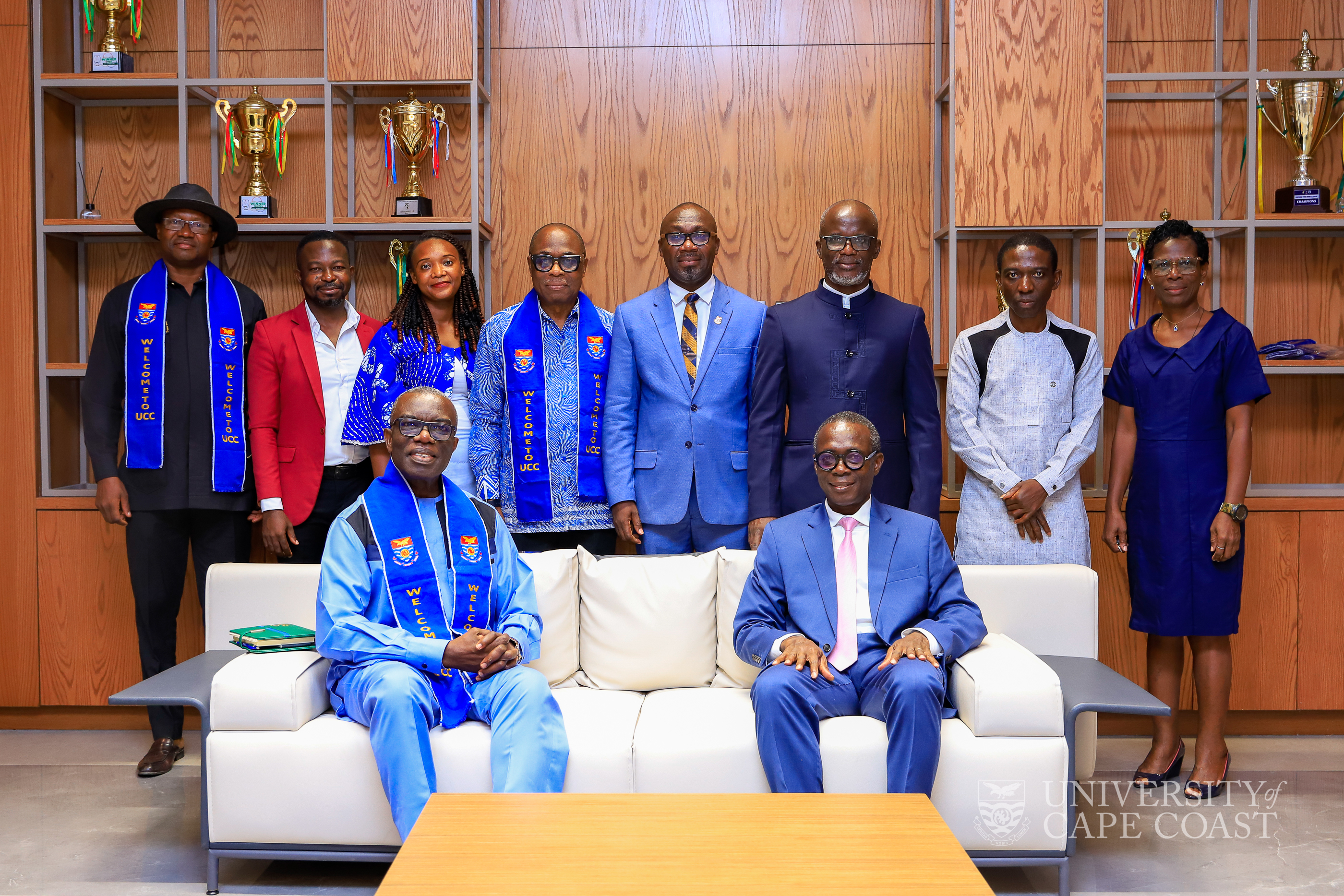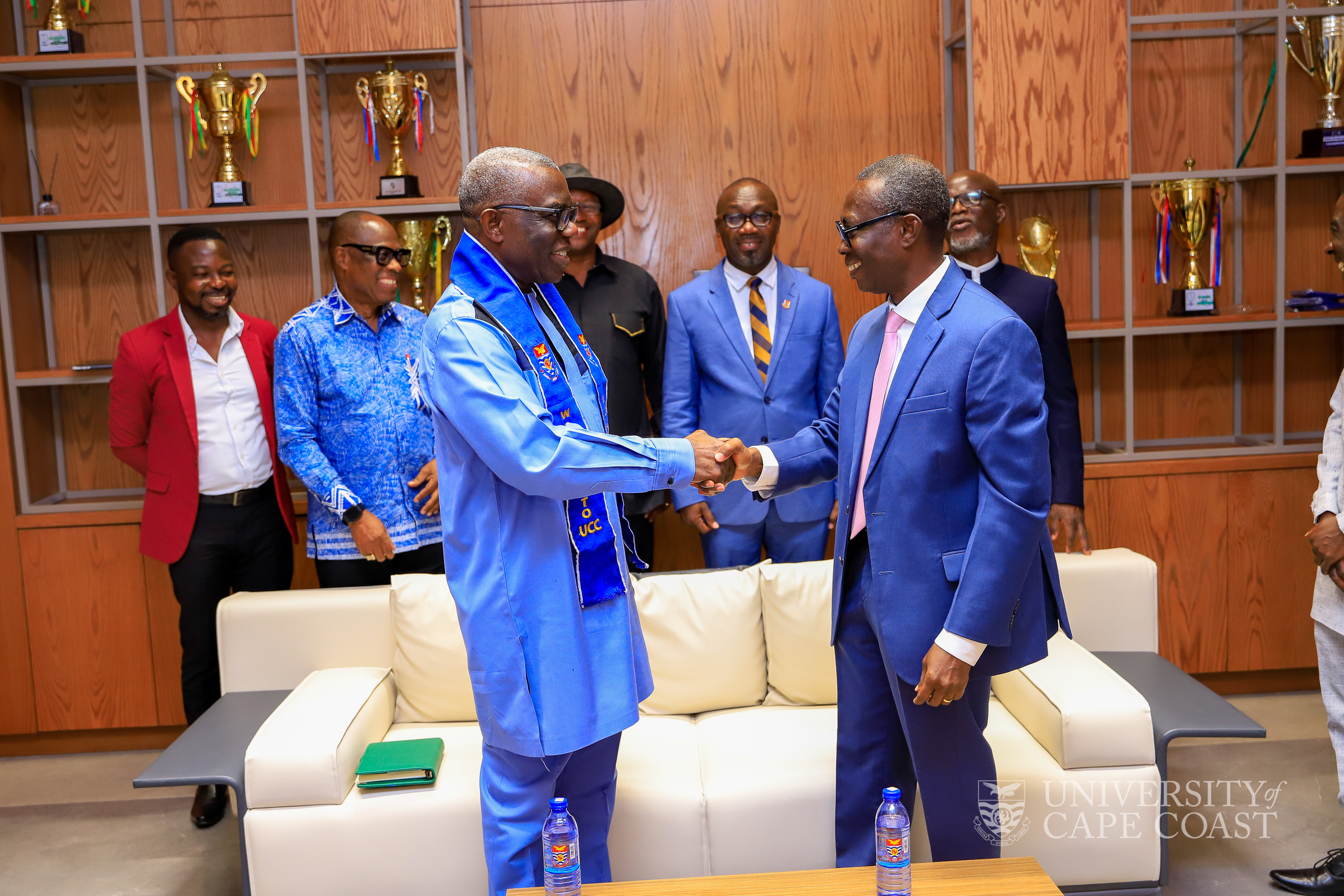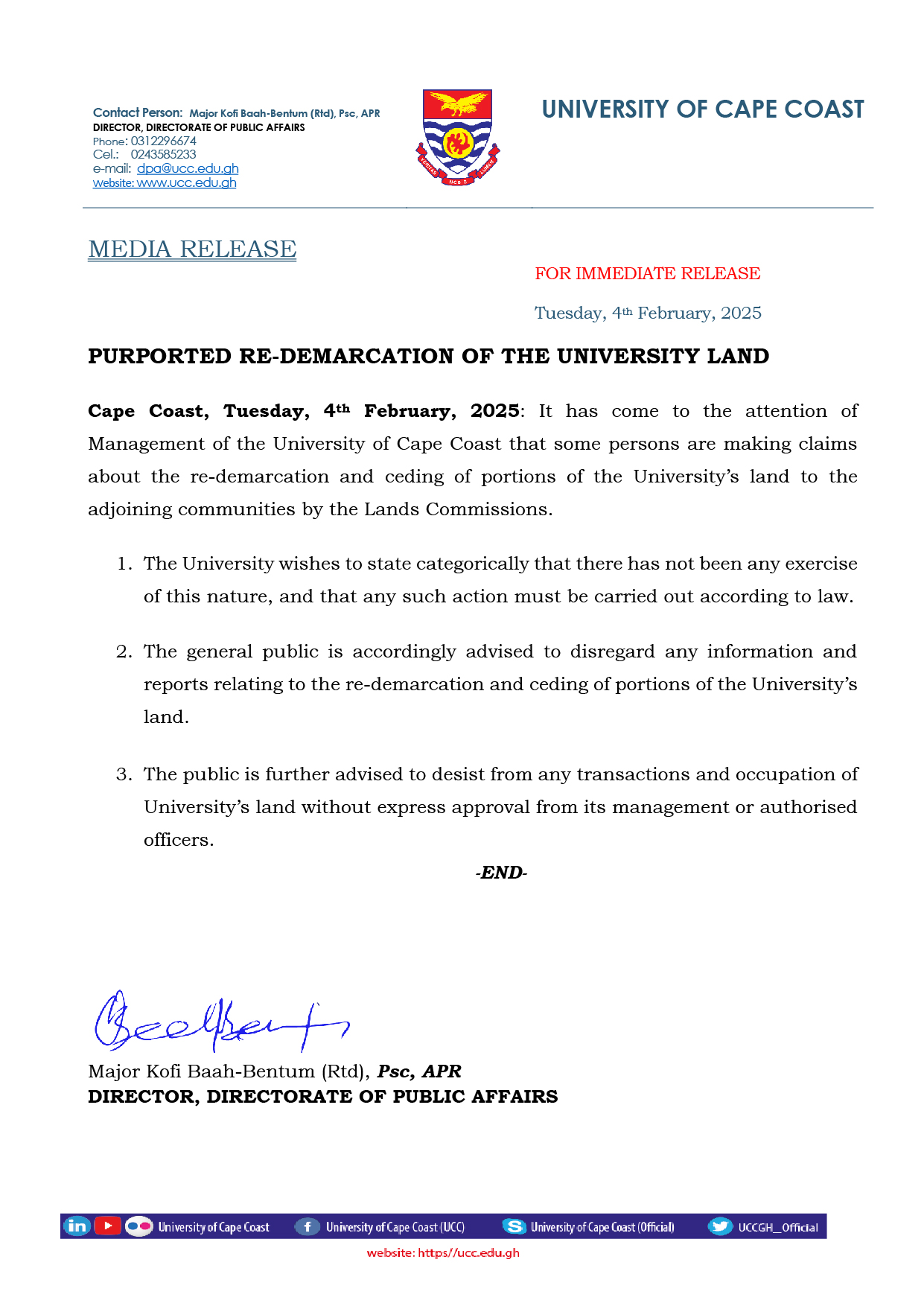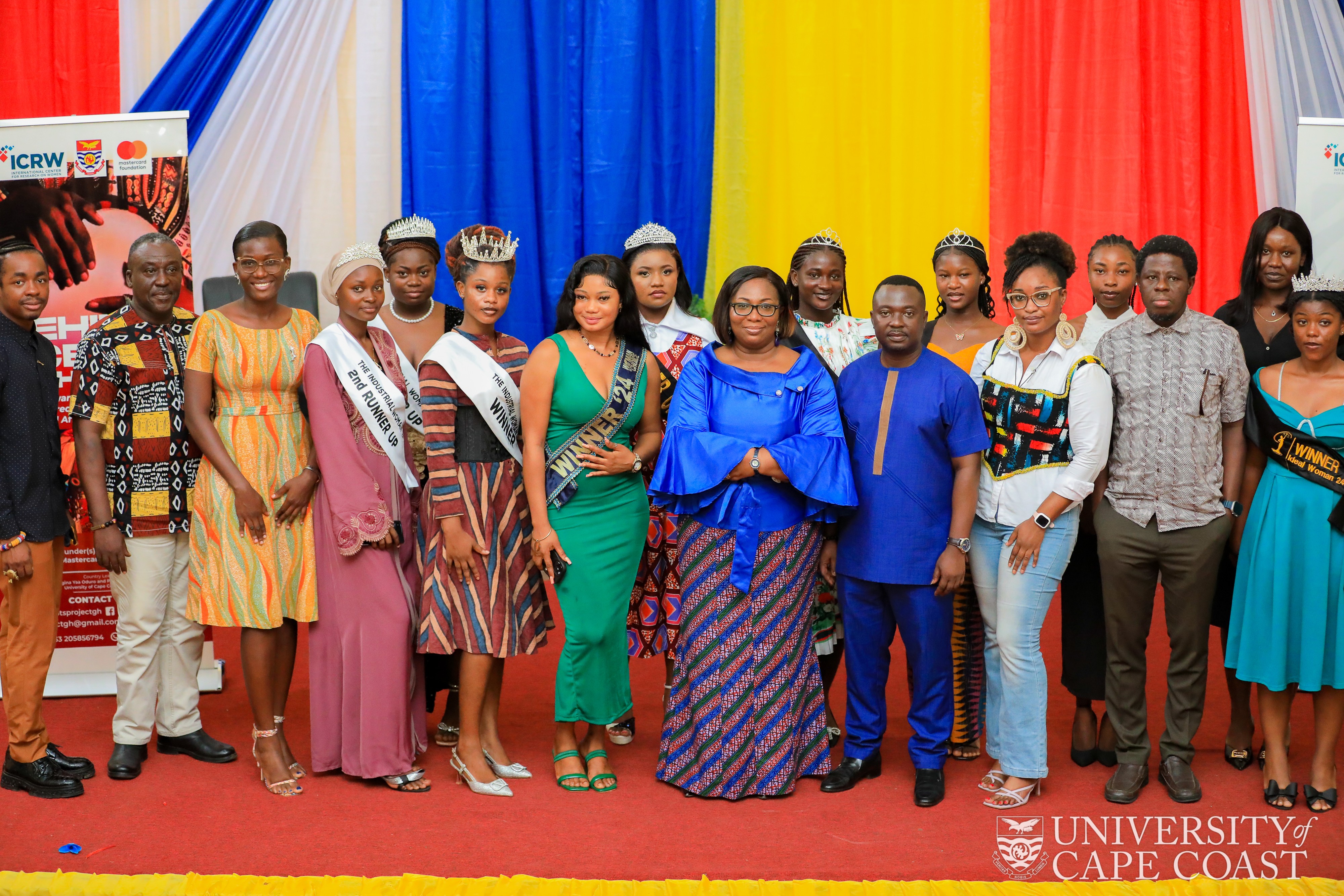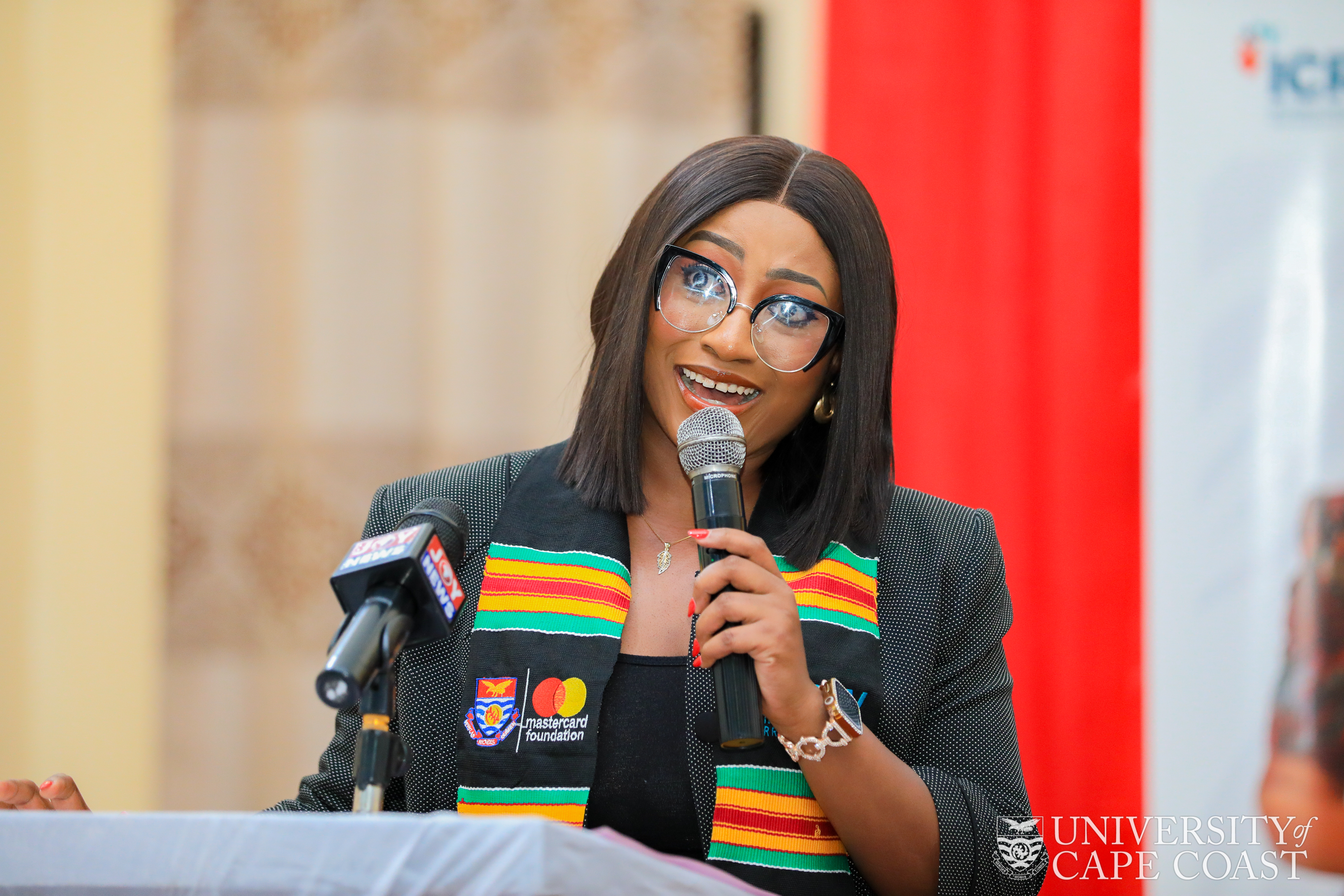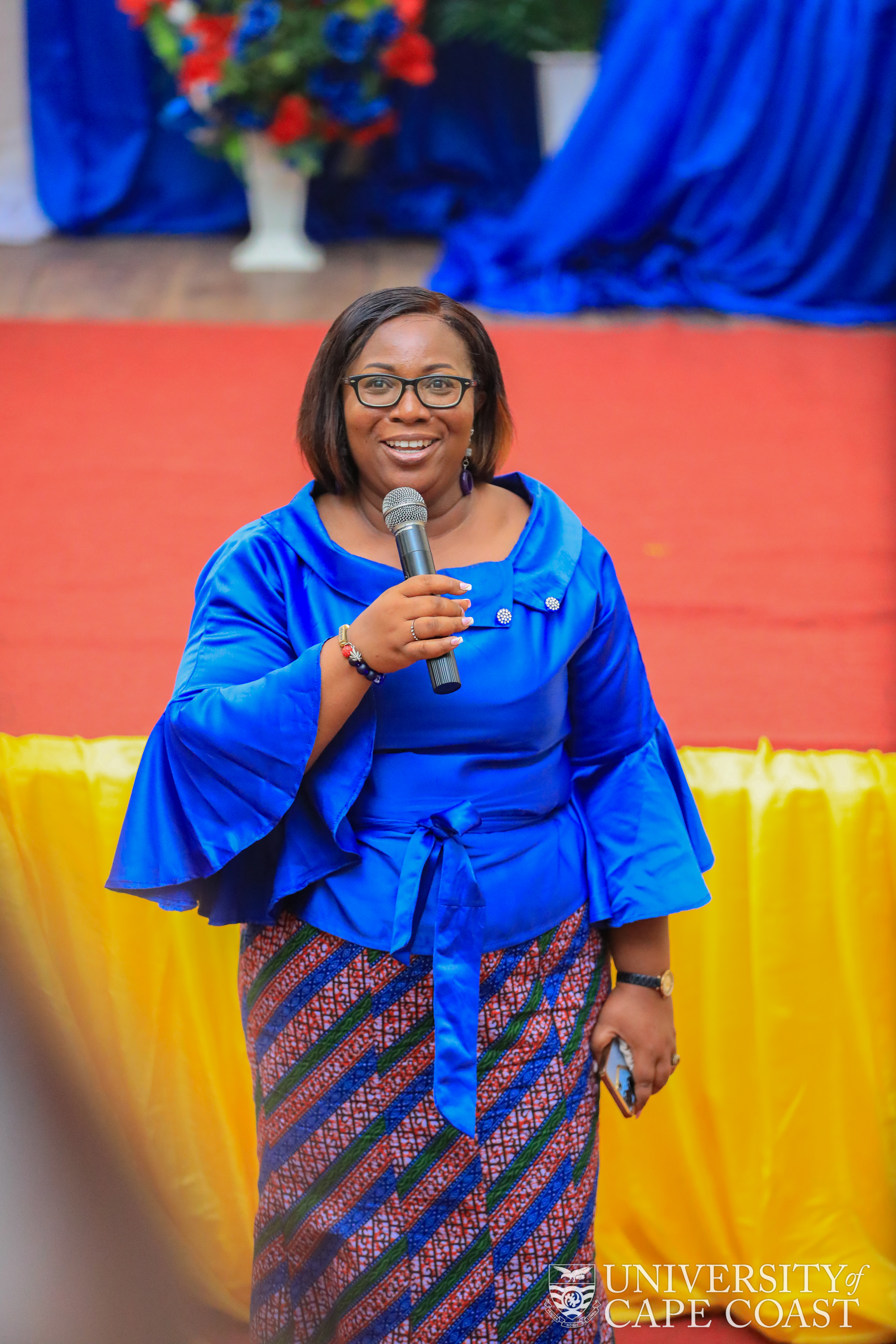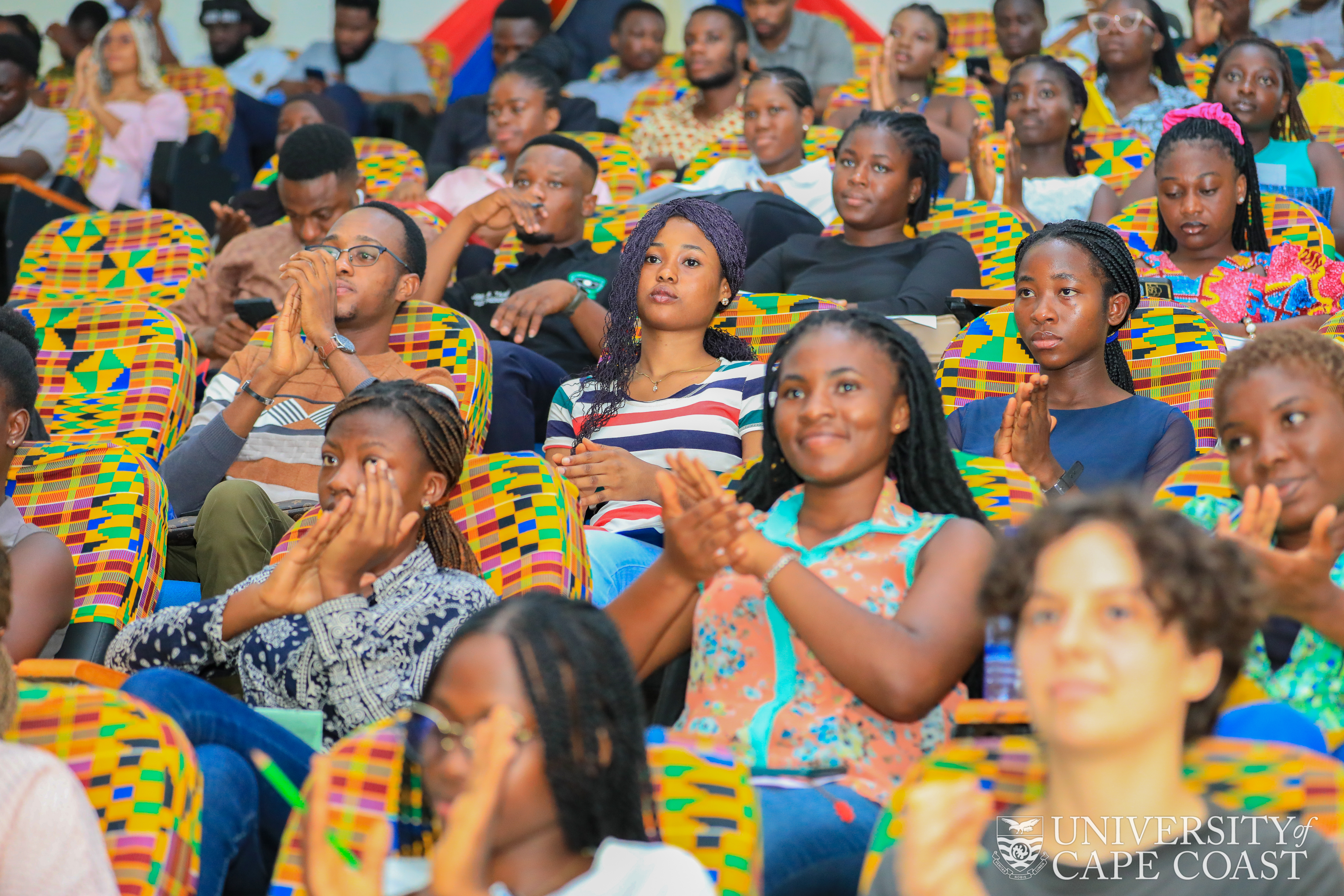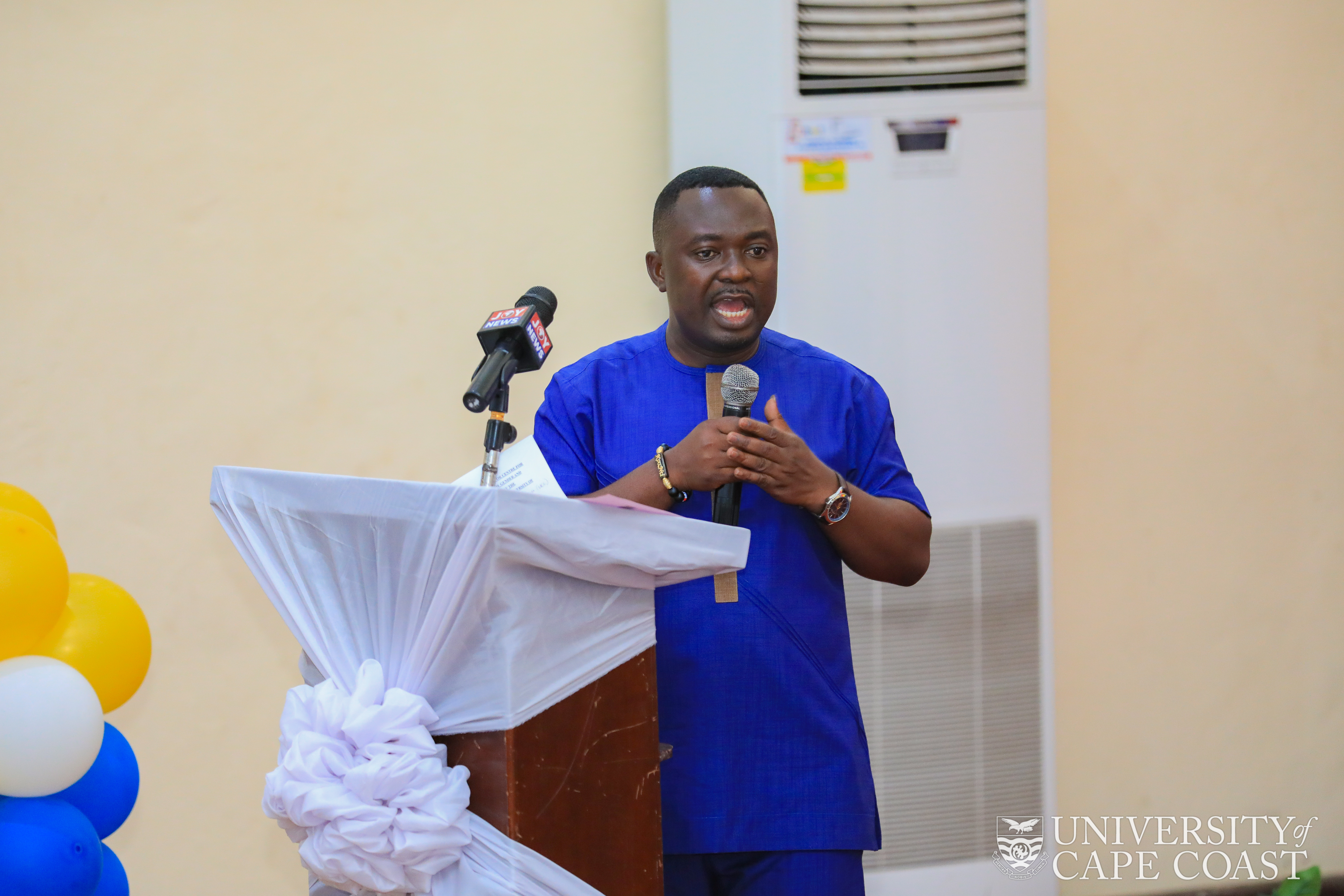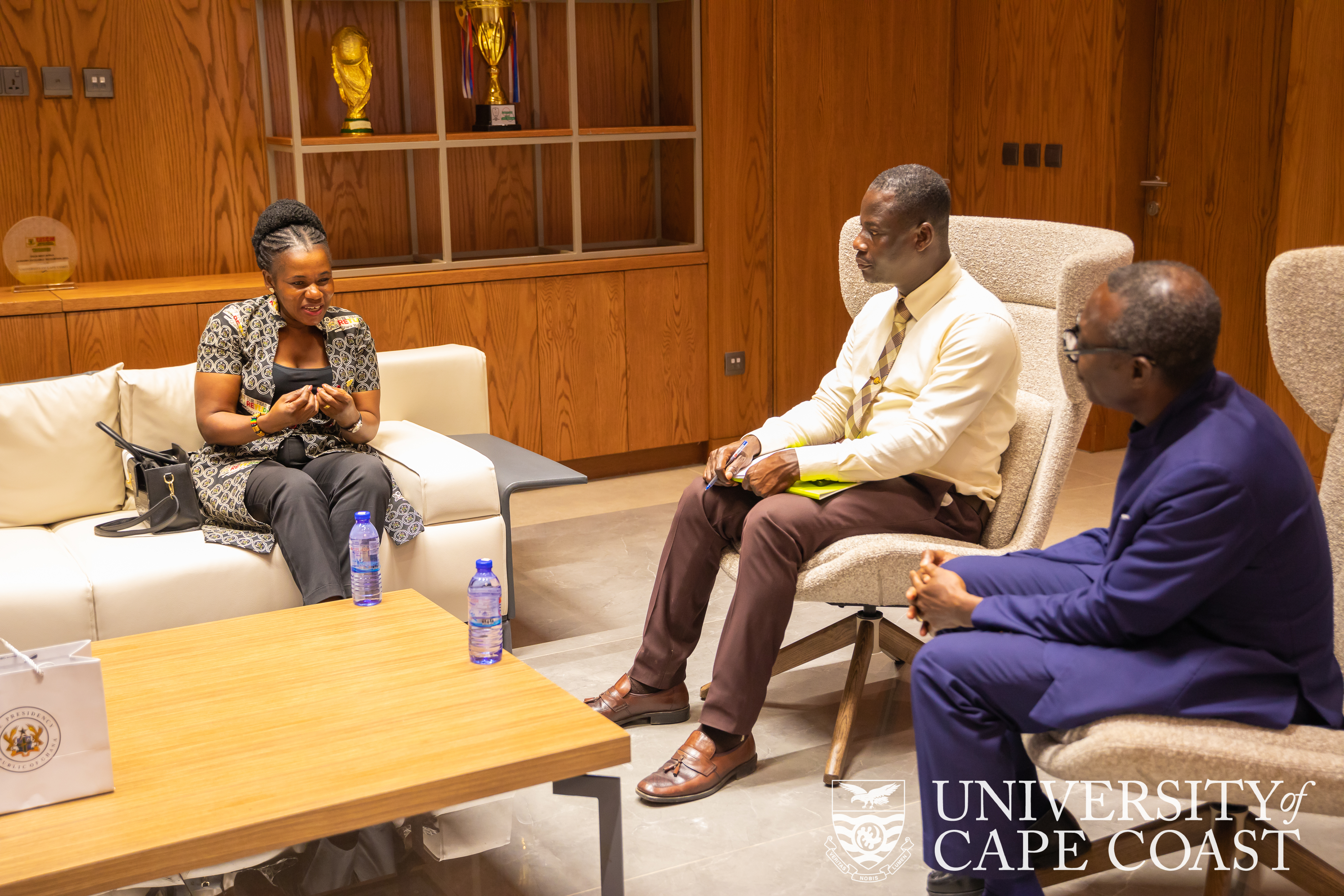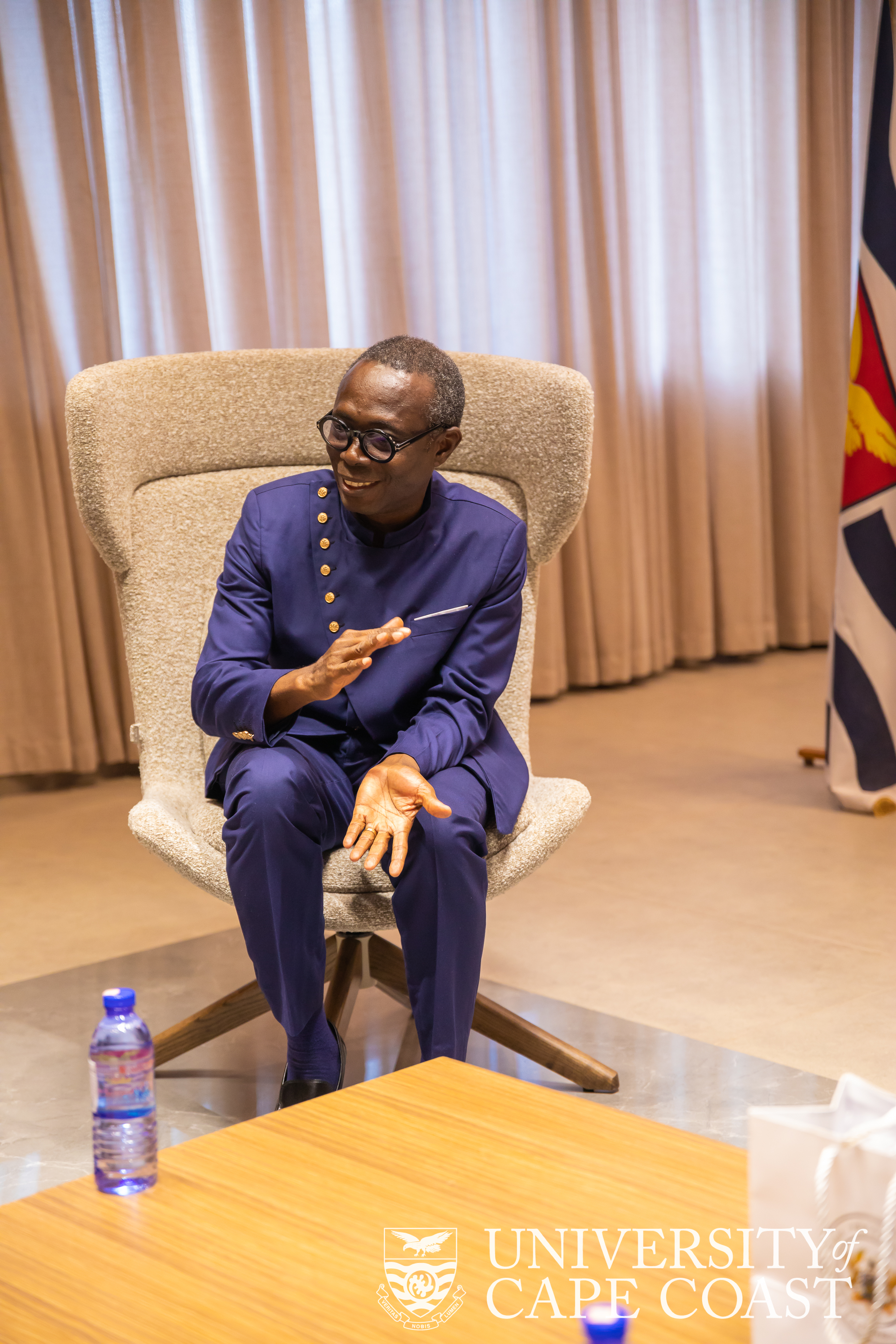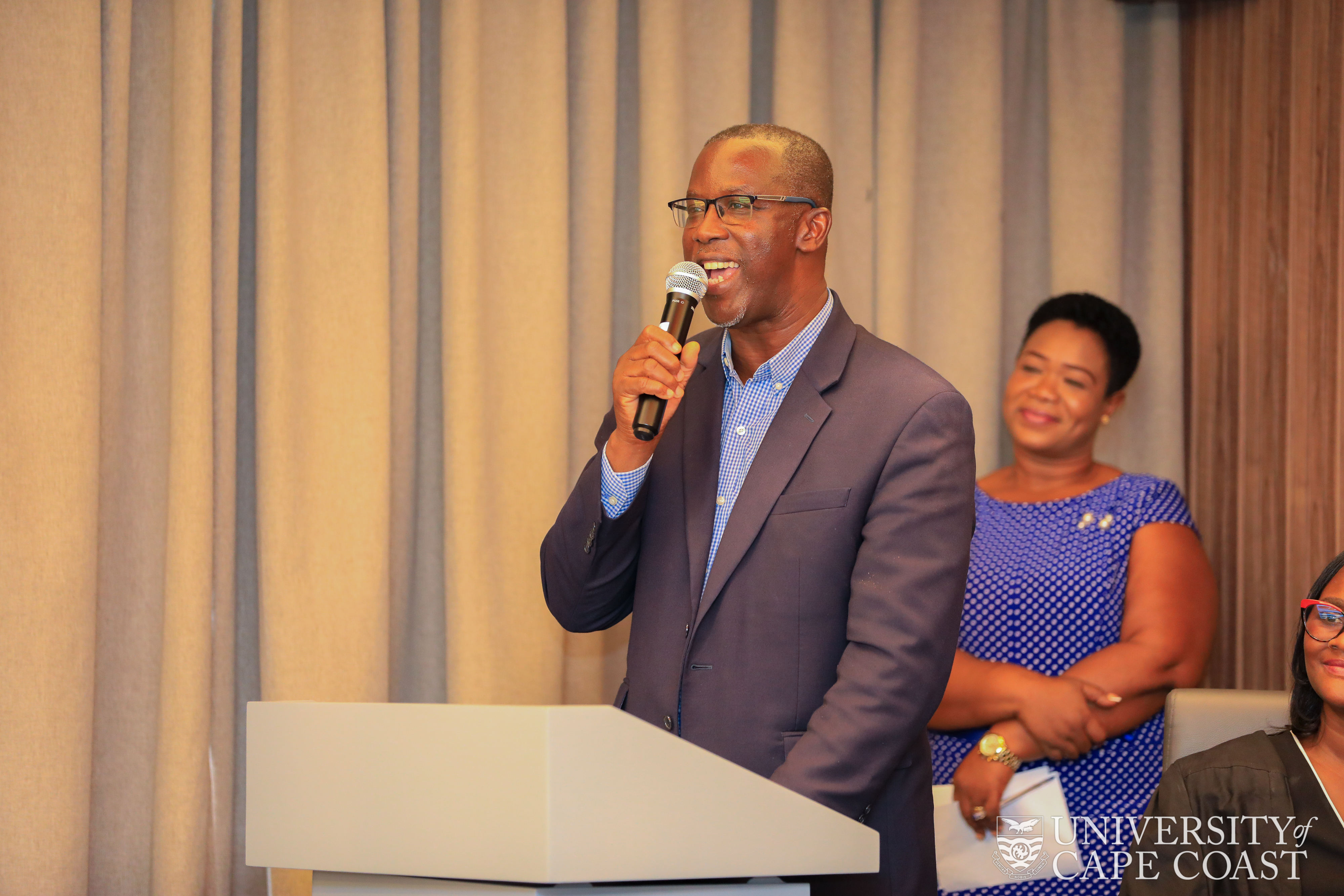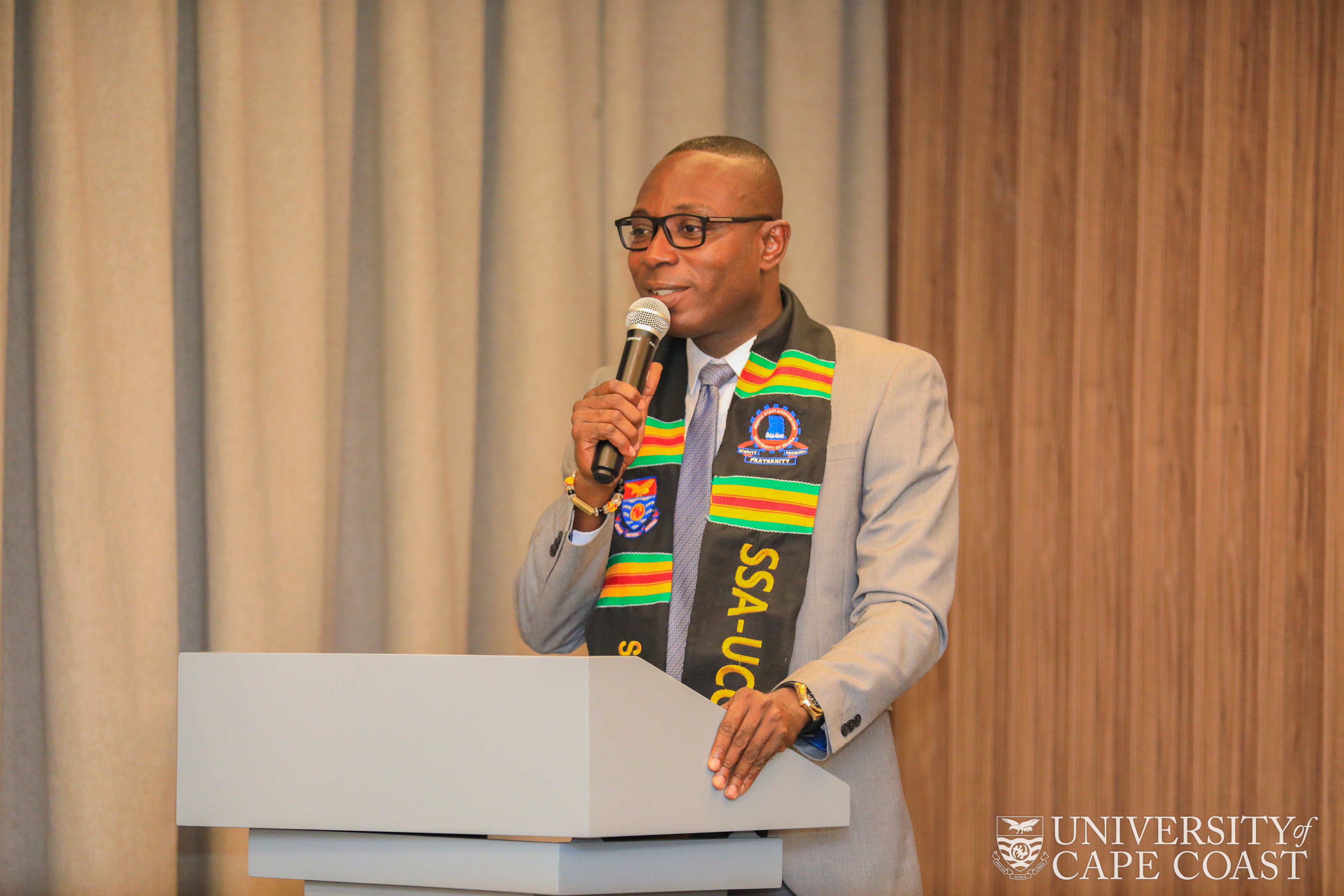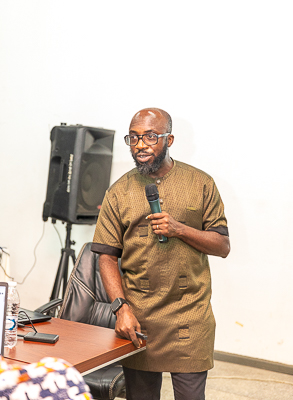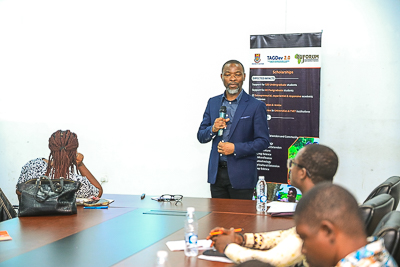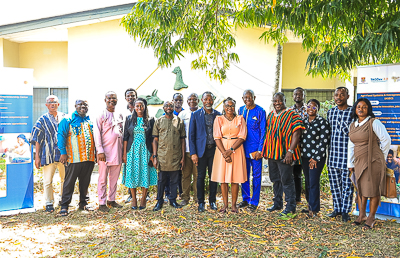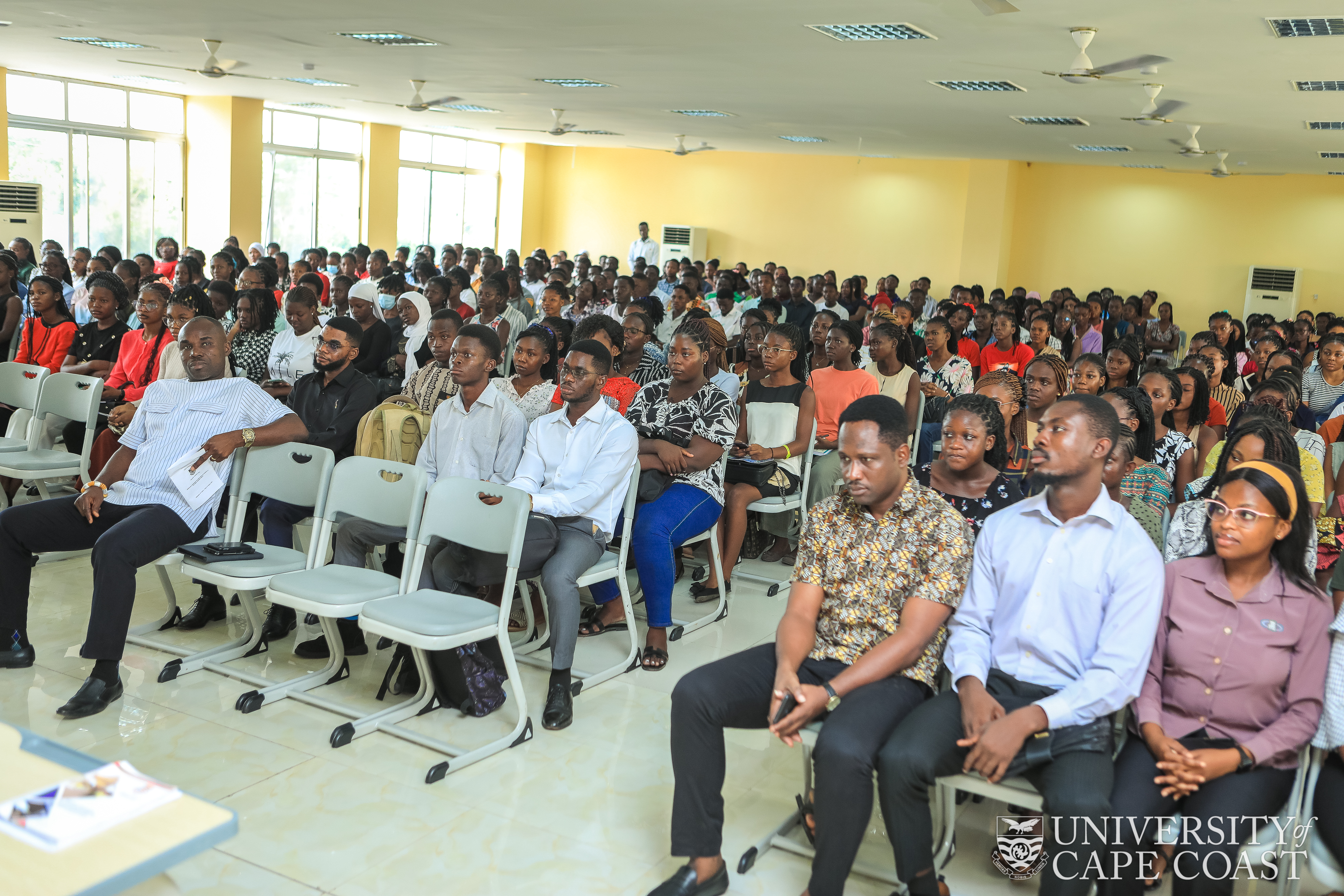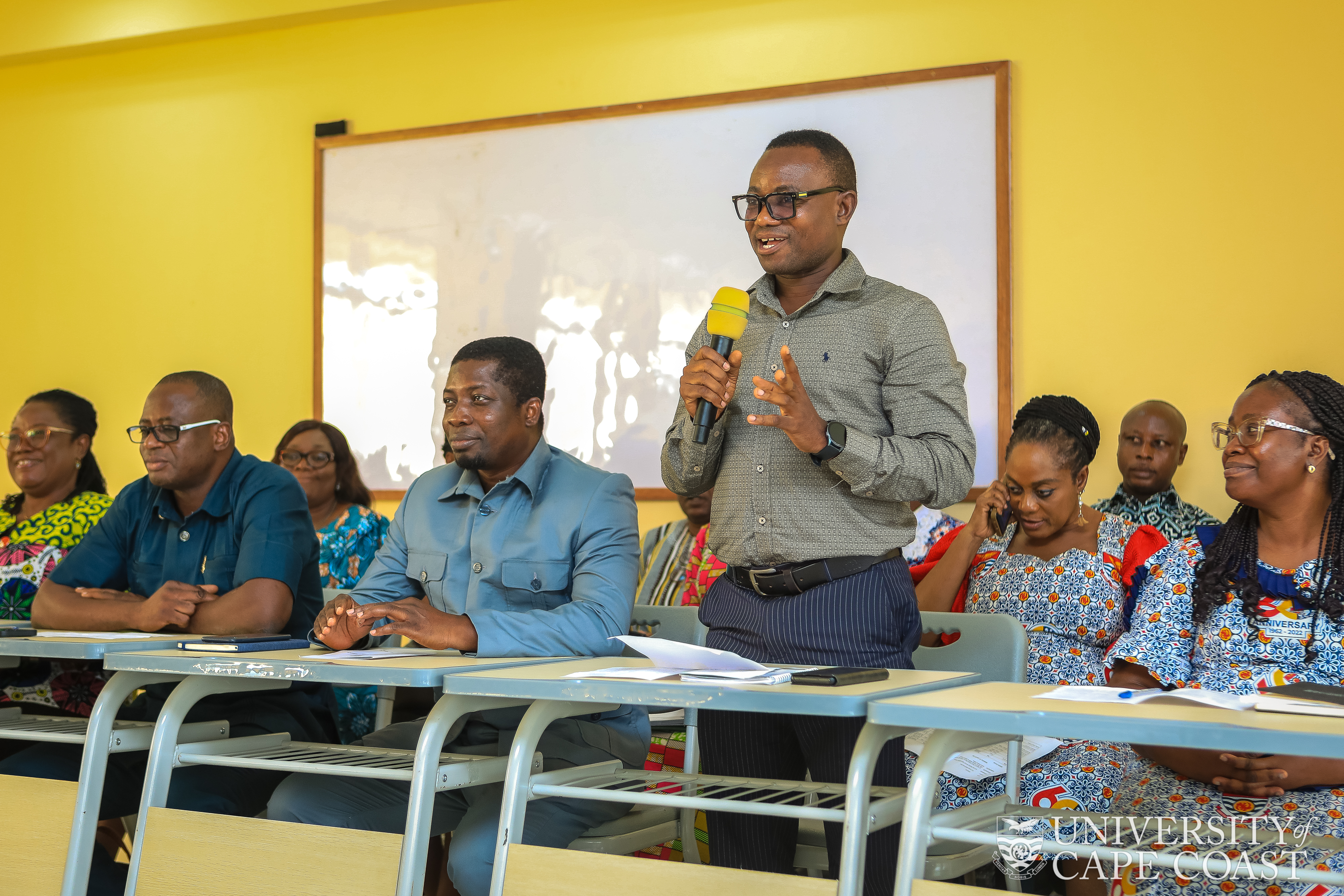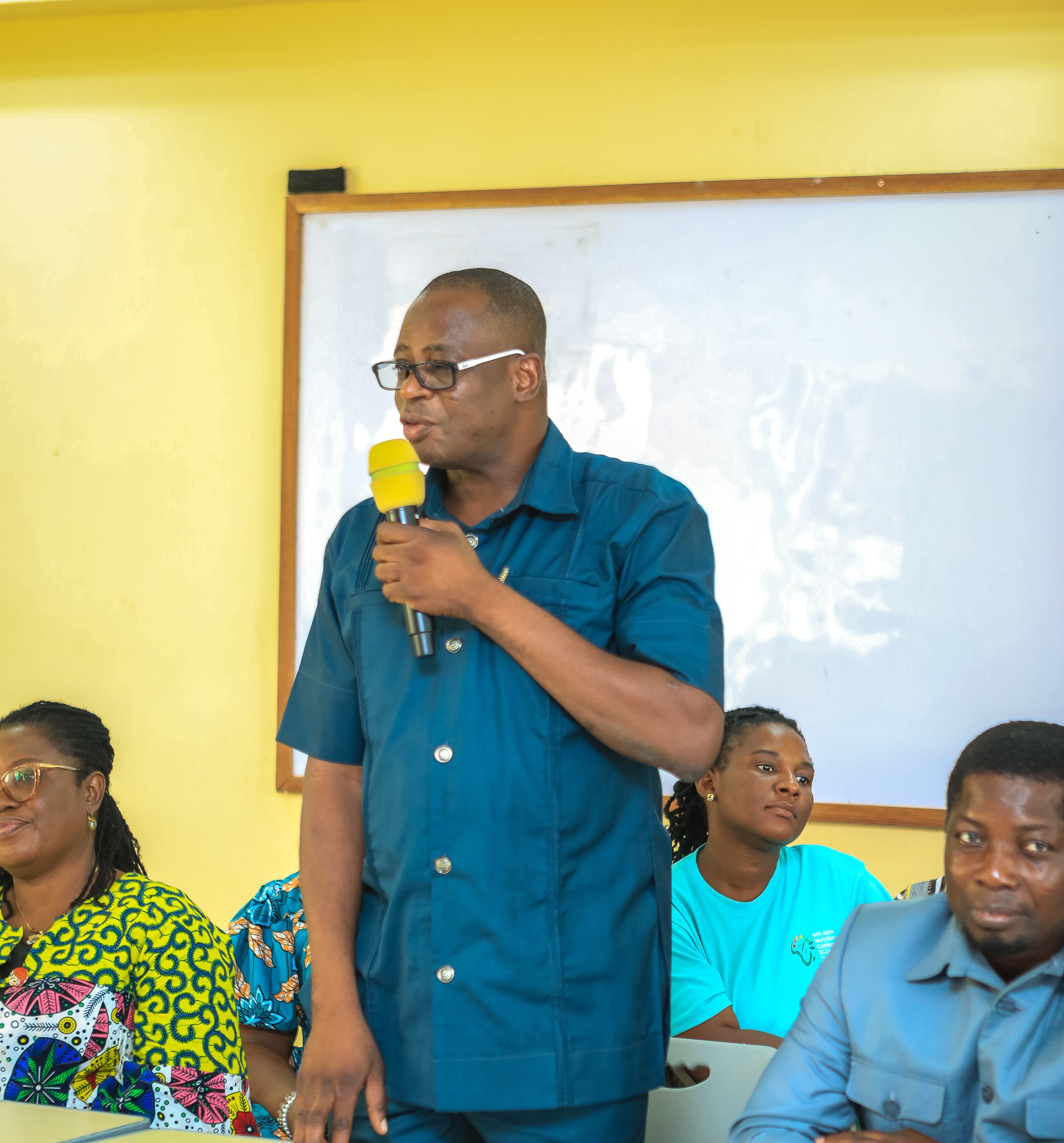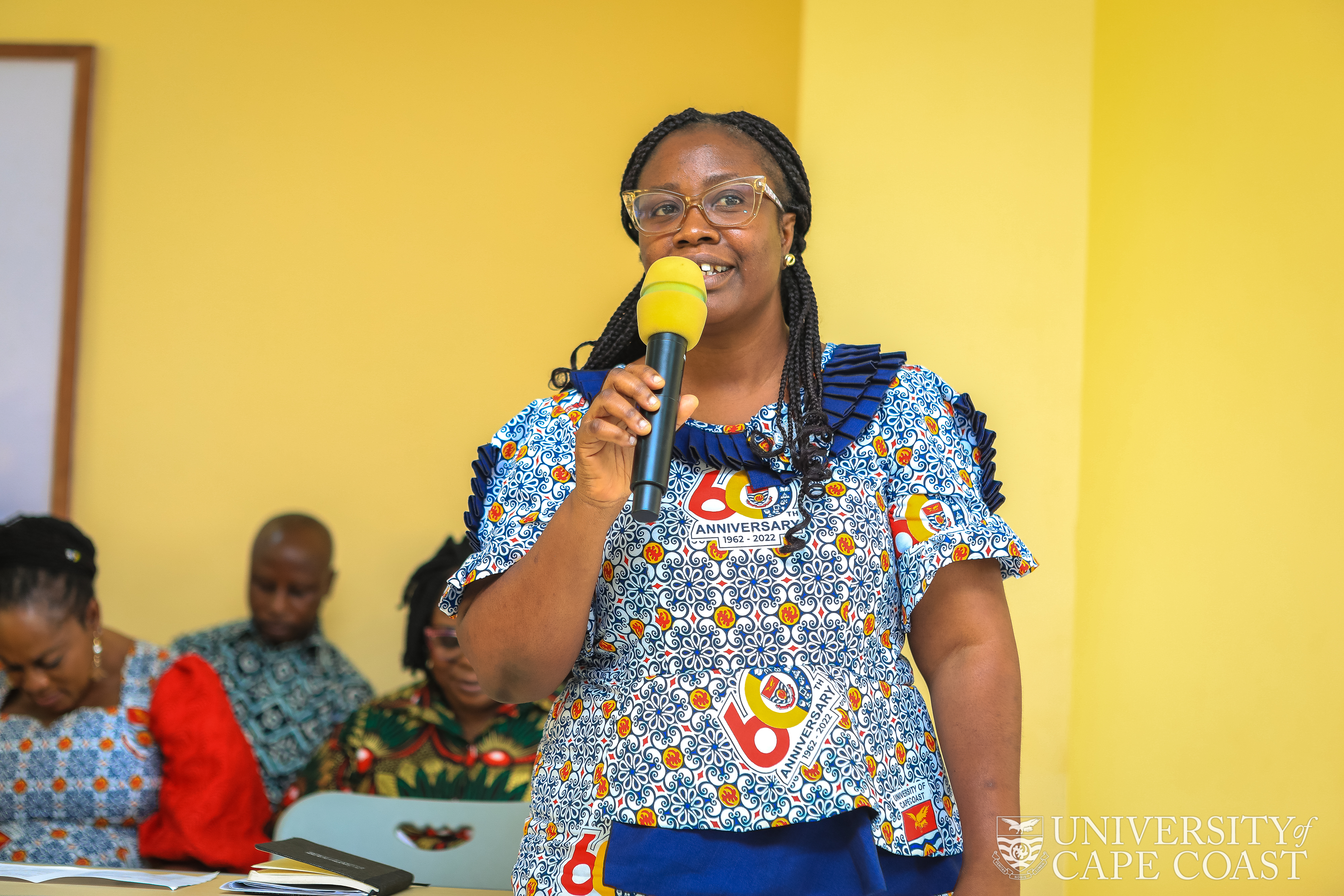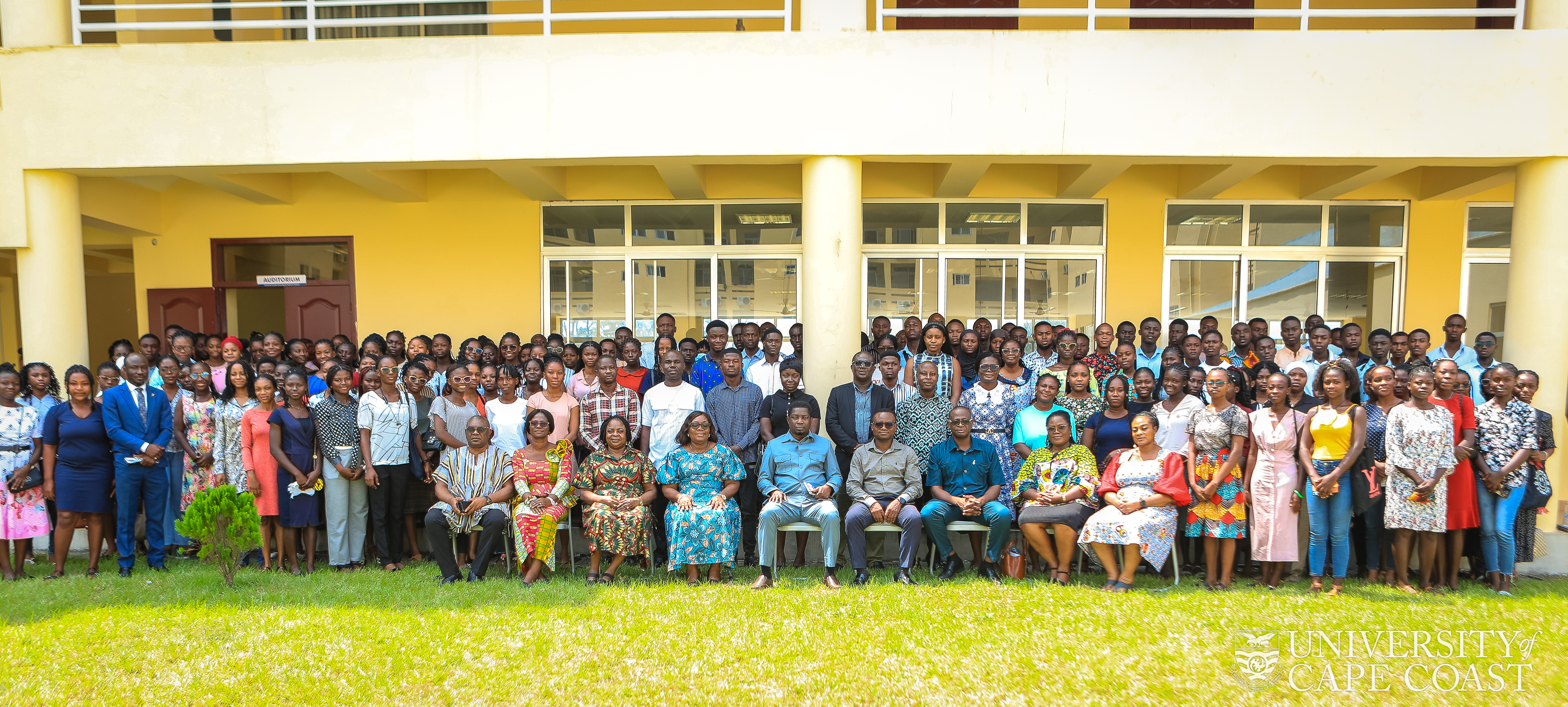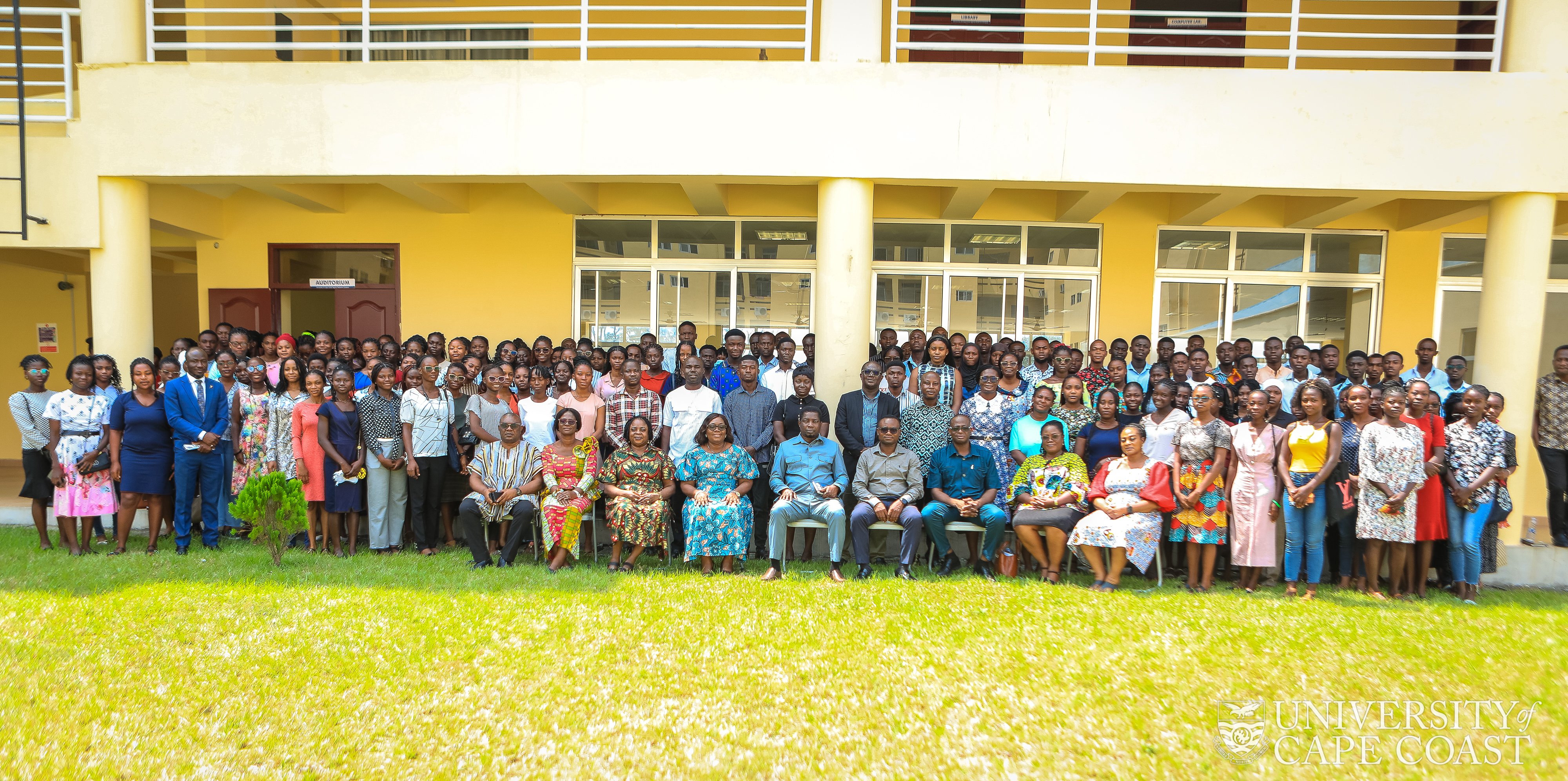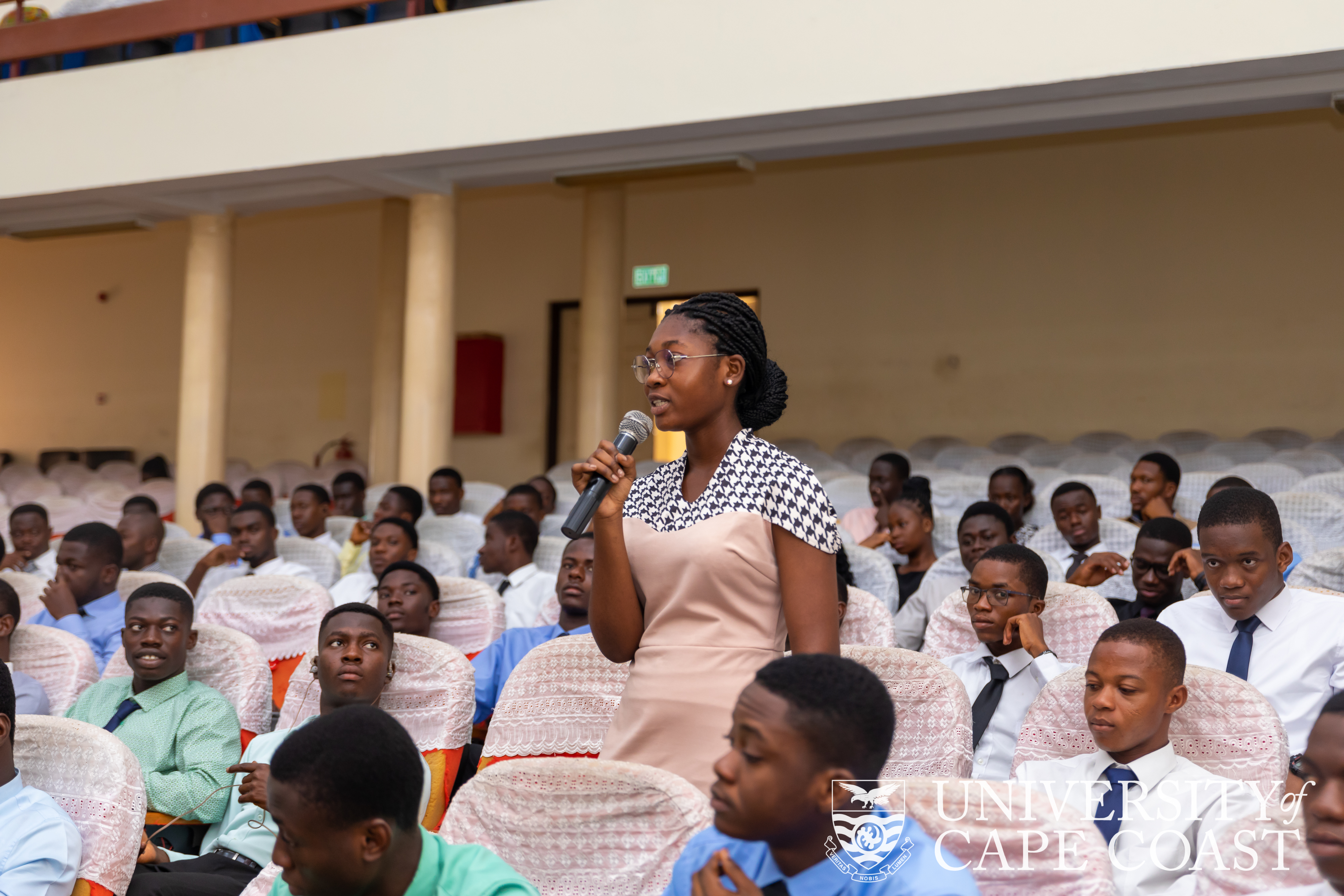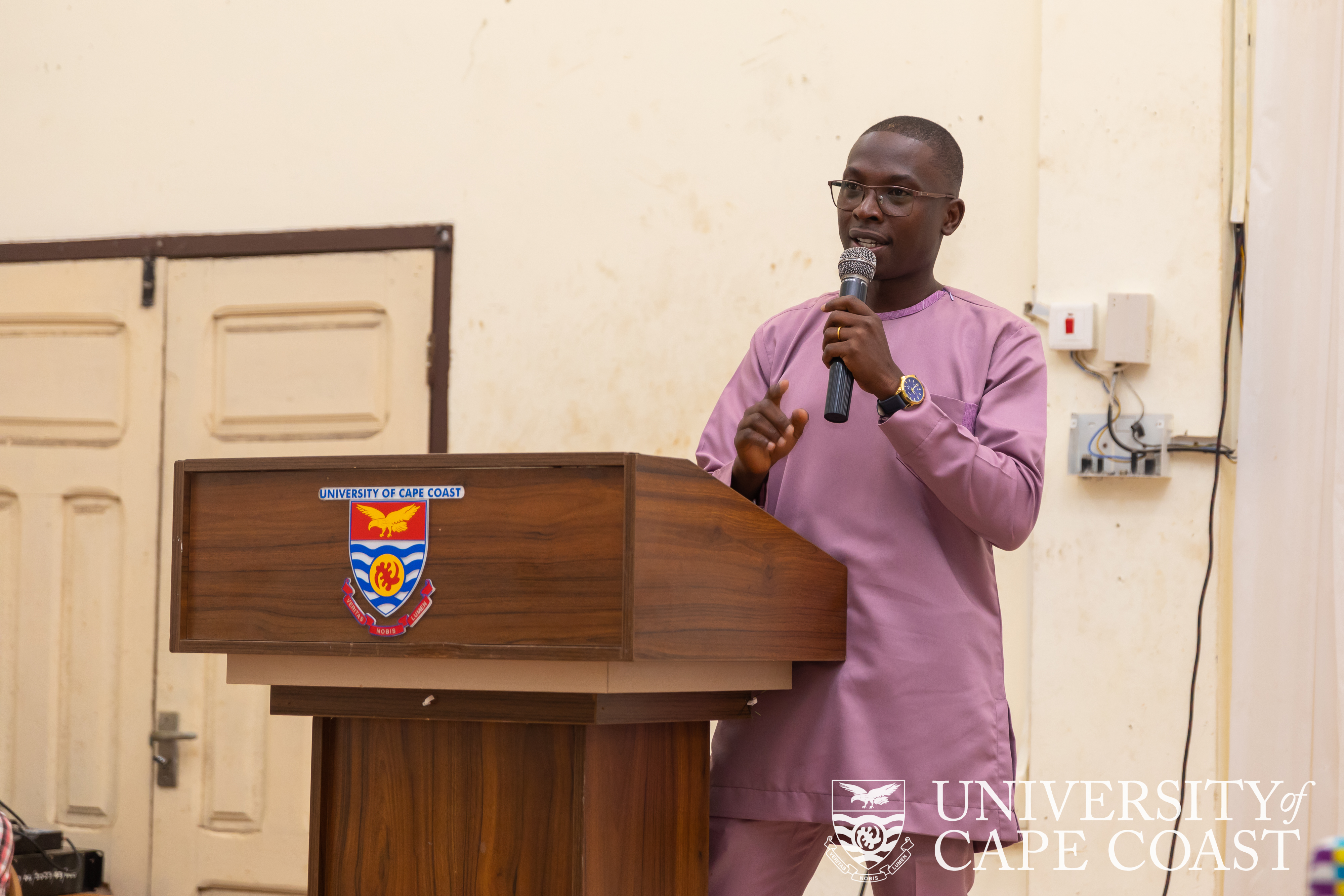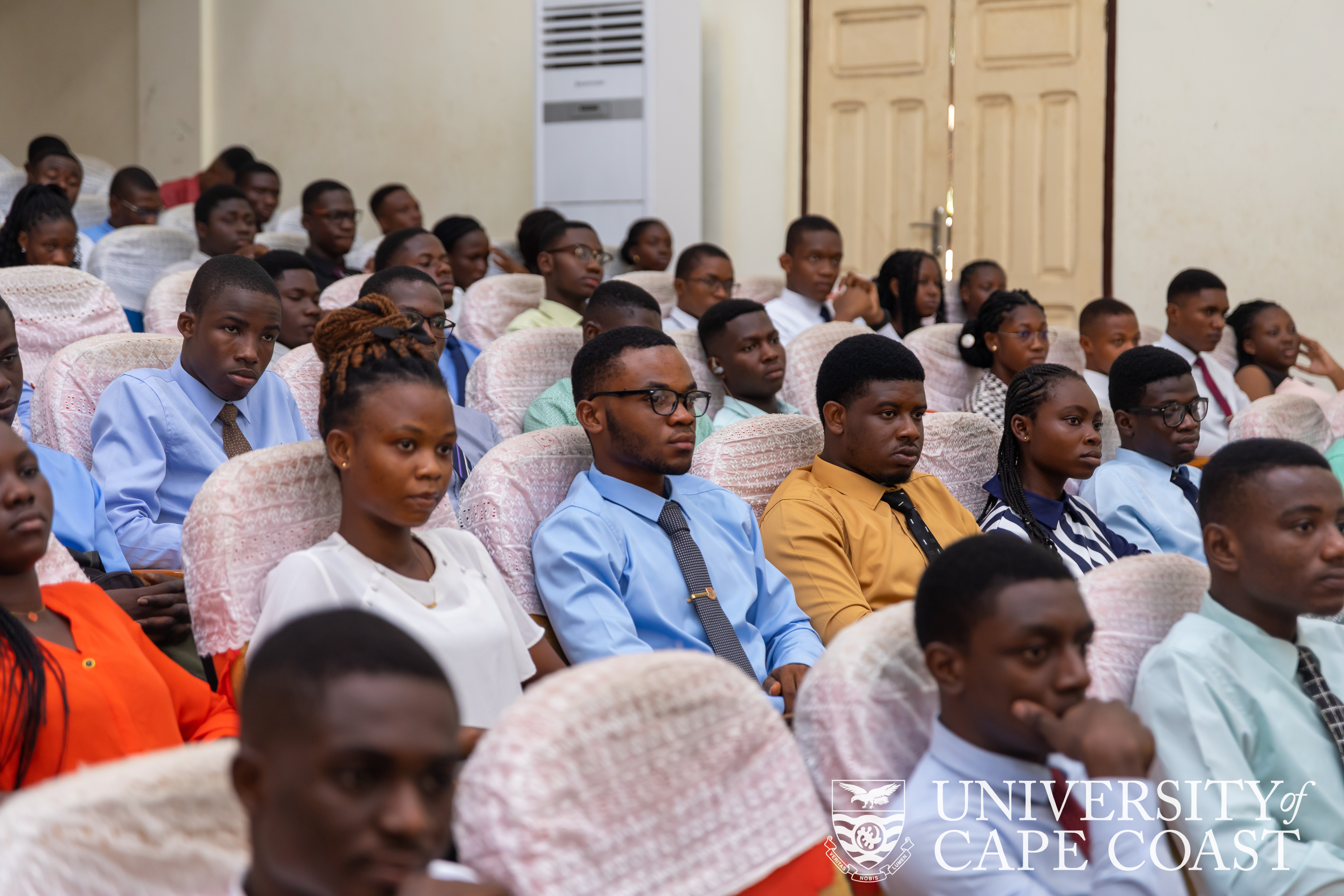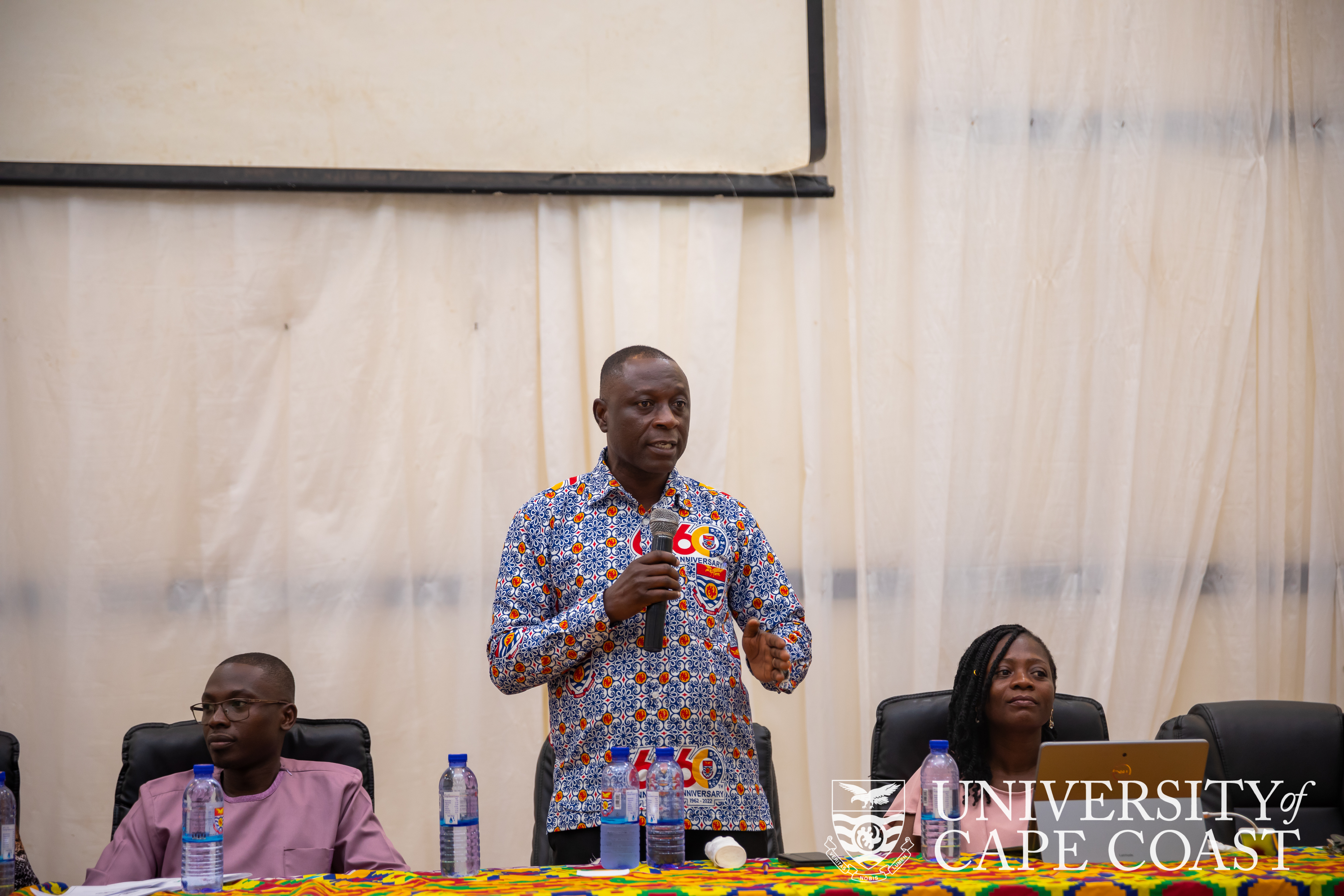Section 1. Background and Purpose
Section 2. Definitions
Section 3. Scope of the Policy
Section 4. Legal Issues concerning the Status of Researchers/ Inventors/Innovators/Creators
Section 5. External Sponsorship and Research Collaboration with Third Parties
Section 6. Ownership of Intellectual Property
Section 7. Conflict of Interest and Confidentiality
Section 8. Identification, Disclosure and Commercialisation of Intellectual Property
Section 9. Recording and Maintenance of the University’s Intellectual Property Portfolio
Section 10. Distribution of Revenues and Motivation for Researchers/Inventors/Innovators/Creators
Section 11. Breach of the Rules of this Policy
Section 12. Dispute and Appeals
Section 13. Additional Provisions
Section 14. Entry into Force of this Policy
APPLICATION FORMS
The mission of the University of Cape Coast (“UCC” or the “University”) is supported by well-established academic values and practices, including academic freedom; promotion
of excellence and innovation in teaching and research; support of the ability of staff, particularly faculty to publish, share information, collaborate in research activities, innovate and develop technologies that benefit the public; and support of students in full participation in these and other educational activities. This policy was developed in consultation with best international practices.
This Intellectual Property (IP) policy applies, among other things, to all research, including self-sponsored and other sponsored projects conducted by or under the auspices of UCC, whether funded by an external or international sponsoring agency, UCC or another funding source. The Research Policy of UCC, Gazette volume 52 number 11, December, 2014, clearly sets out these funding sources. It is the policy of UCC to comply with requirements imposed by an external sponsoring agency and by Ghana law, including but not limited to the Patent Act, 2003 (Act 657), the Copyright Act, 2005 (Act 690) and with other legal obligations applicable to UCC. This Intellectual Property policy resonates with the tenets of the research policy of UCC. The research policy provides the framework for delineating the links between research, innovation and consultancy. Sections 3.5 and 3.6 of the research policy define what constitute innovation and intellectual property policy in the context of UCC.
In addition, this IP policy is in compliance with Ghana sponsoring agency requirements and Ghana’s Intellectual Property Rights Policy. Research must be conducted in accordance with UCC policies. Each member of the University Community is responsible for assuring his or her compliance with the requirements applicable to such person’s specific research and other sponsored projects.
As set out in the Research Policy, the Directorate of Research, Innovation and Consultancy (DRIC) is mandated to coordinate research activities in the University. Therefore, DRIC in consultation with the Directorate of Legal, Consular and General Services of the University of Cape Coast will be responsible for operationalizing this IP policy.
Section 1. Background and Purpose
One of the goals of the University of Cape Coast, as set out in the research policy, is to encourage creativity and prompt and open dissemination of ideas and inventions by recognising
and rewarding individual members of faculty, non-teaching staff and students. The commitment to develop new knowledge includes facilitating the practical application of that knowledge for public use. The University wishes to demonstrate that the public and private investments in funded research at UCC result in the creation of ideas and inventions that benefit society.
The University wishes to preserve the academic tradition of faculty ownership of certain scholarly works within the context of applicable law. The laws of Ghana provide that the University owns all intellectual property created or developed by an employee within the scope of his or her employment, including works developed under sponsored research or other agreements and works that make significant use of University funds or facilities. In seeking an appropriate balance between academic tradition and law, UCC’s Intellectual Property Policy recognises certain exceptions to the law that are well-established traditions in the academic setting.
The present Policy relates to the ownership, protection and commercial exploitation of Intellectual Property created by Researchers/Inventors/Innovators/Creators in the course of their duties or activities at the University. The document sets out the rules of the University for co-operation with industrial and business organisations and provides guidelines on the sharing of the economic benefits arising from the commercialisation of Intellectual Property. The purpose of this Policy is to educate members of the Universitycommunity about their rights and responsibilities regarding intellectual property. This Policy also describes the ways in which UCC faculty, non-teaching staff and students can protect the intellectual property that they create for their benefit as well as preserve the interests of the University and the public.
It is anticipated that this Policy will be augmented from time to time by statements of policy or practice that are focused on particular types of intellectual property, especially those arising out of new or evolving media or technology. Further, this Policy may be amended over time to effect changes deemed to be in the best interest of the University community.
This Policy aims to:i) Promote, encourage and aid scientific investigation and research; ii) Provide legal certainty in research activities and technology-
based relationships with third parties;iii) Set out the University’s procedures on the identification,
ownership, protection and commercialisation of Intellectual Property;iv) Ensure timely and efficient protection and management of
Intellectual Property;v) Facilitate the recording, monitoring and maintenance of the
University’s Intellectual Property portfolio;vi) Ensure that economic benefits arising from the commercialisation
of Intellectual Property are distributed in a fair and equitable manner, recognising the contributions of the Inventors, the University as well as any other relevant stakeholders;
vii) Enhance the reputation of the University as an academic research institution and the visibility of the researchers, creators and inventors.
In recognition of the foregoing, the University shall:
i) Recognise the right of faculty, non-teaching staff and students to publishtheirownresearch resultsandotherscholarlyinformation unless the principal investigator has agreed to restrictions in the agreements supporting such sponsored research.
ii) Ensure that any individual who creates intellectual property should have a significant role in the determination of how such intellectual property will be registered, protected, enforced,
monitored, publicised, commercialised or developed.
iii) Permit faculty, non-teaching staff and student inventors/authors the freedom to place their inventions in the public domain if they believe that would be in the best interest of science or technology transfer and that doing so would not violate the
terms of any agreement.
iv) Provide patent, copyright, licensing, legal advice and technology
transfer services to assist in the registration, enforcement, monitoring, protection, marketing and promotion of University- owned intellectual property.
v) Provide services for registering trademarks and service marks.
vi) Provide the necessary financial resources for the protection and
commercialisation of intellectual property, in appropriate cases.
vii) Reward authors and inventors through sharing of royalties from
inventions assigned to the University.
viii) Reward Colleges, Faculties/Schools and Departments for
creatingproductiveresearchenvironments bysharingaportion of the royalties from inventions assigned to the University.
Section 2. Definitions
In the policy, unless the context otherwise requires, the following terms, without limitation shall have the meanings assigned to them.
Author means any individual who creates a work that is protectable under the Copyright Act.
Asset means anything you or your institution owns or is entitled to, such as cash, investments or money owned. It includes Intellectual Property.
Assignment means the document executed by UCC which confers legal transfer of the title and interest in intellectual property.
Background IP means any invention and know-how or other Intellectual Property (whether or not patentable) owned by one of the parties or a third party prior to the commencement of a particular Project or devised or discovered by them only in the course of other projects and not arising directly from the Project.
Creator means any person(s) to whom this policy is applicable, who create, conceive, reduce to practice, author or otherwise make a substantive intellectual contribution to the creation of IP and who meets the definition of “inventor” as implied in Ghana’s Patent Act of 2003 or the definition of author as generally applied in Copyright Law.
Commercialisation means any form of exploitation of Intellectual Property, including assignment, licensing, internal exploitation within the University and commercialisation via a spin-off enterprise.
Confidential Information means any IP, information or data of a confidential nature, including all oral and visual information or data, and all information or data recorded in writing or in any other medium or by any other method, and all IP, information and data which UCC is under obligation, whether contractual or otherwise, not to divulge.
Copyright is a right to prevent copying, and is intended to protect the expression of an idea, not an idea itself. In Ghana, copyright arises automatically upon the creation of any work in which copyright subsists, and is not capable of registration. There are different categories of work in which copyright can subsist, such as dramatic, literary or musical works, computer generated works, films, sound recordings and broadcasts. For most categories of copyright work, copyright will last for a period of the lifetime of the author (or the last living author if the work is a work of joint authorship) plus 70 years.
Copyrighted Works means literary, scientific and art works, including academic publications, scholarly books, articles, lectures, musical compositions, plays, films, presentations and other materials or works other than software, which qualify for protection under the copyright law.
Due Diligence aims to establish who the legal owner of the IP is and to also establish who has rights over it. Due diligence helps the Business Manager to identify and resolve any potential obstacles to the exploitation of the IP in question. During the due diligence phase, all necessary documentation is gathered and evidenced.
Equity means shares of stock or securities including, but not limited to, stock Options, warrants or any other rights to purchase stock or securities.
External Sponsorship is any financial or in-kind support provided by
a source other than UCC.
Geographical Indicators means indicators which identify a good as originating in the territory of a country, or a region or locality in that territory, where a given quality, reputation or other characteristic of a good is essentially attributable to its geographical origin.
Gross Revenues means all incomes received by the UCC under a license agreement but does not include research funds (unless the research funds offset future royalty obligations) and maintenance fees received under the license agreement.
Independent Contractors or Consultants means persons hired by UCC on a limited basis, for a limited purpose as specified in a contract, are considered staff with respect to IP arising from any use of UCC resources.
Industrial Design refers to the right granted to protect the original, ornamental and non-functional features of a product that result from design activity. The right concerns merely the appearance (the ‘design’) of a product, not the product itself.
Innovation means a new or original product or process.
Innovator means scientist, researcher, author or performer. This includes a staff member (researchers and non-researchers), including any other person employed by the UCC, whether full or part- time, company representatives, administrators and any other persons who create or discover applicable intellectual property using UCC resources or who receives funds or other rewards for their services (work- for-hire), work done through research whether or not funded by the Government, or those who voluntarily assign their intellectualproperty to the UCC.
Integrated Circuit of Layout Designs: The layout design (topography) of integrated circuits is an original three-dimensional rendition of integrated circuits used in microchips and semiconductor chips intended for manufacturing. It has a term of protection of 10 years, which cannot be renewed.
Infringement refers to using IP without the owner’s permission.
Intellectual Property (IP) means all outputs of creative endeavour in any field at the UCC for which proprietary rights may be obtained or enforced pursuant to any law, including the laws of Ghana, and includes, but not limited to: Inventions (whether patentable or not), all forms of copyrighted works, design (whether registered or unregistered), patents, new plant varieties, new breed of animals, traditional knowledge, trademarks, know-how, trade secrets, domain names, information, data, discoveries, mathematical formulae, specifications, diagrams, expertise, techniques, research results, computer software, programming code, algorithms, compositions of matter and devices, techniques, processes, procedures, systems, formulations, databases and compilations of information, laboratory notebooks, business and research methods, the name of the UCC badge and other marks associated with the UCC, Tangible Research Property, and such other property as may be specified by the UCC in writing.
Intellectual Property Rights (IP Rights) means ownership and associated rights relating to Intellectual Property, including patents, rights in utility model, plant and animal breeders rights, rights in designs, trademarks, topography rights, know-how, trade secrets and all other intellectual or industrial property rights as well as copyrights, either registered or unregistered and including applications or rights to apply for them and together with all extensions and renewals of them, and in each and every case all rights or forms of protection having equivalent or similar effect anywhere in the world.
Invention means a creation or new, useful, and non-obvious ideas and/or their reduction to practice that result in, but are not limited to, new products, devices, processes, and/or methods of producing new and/or useful industrial operations and materials, any article useful in trade or any composition of matter that is industrially useful or that has commercial potential, new varieties of plants and breeds of animals, new designs in the production or manufacture of an article, databases, circuit designs, prototype devices, equipment and any improvement upon existing processes or systems.
Invention Disclosure means the written submission to the Intellectual Property Office (IPO) at DRIC on the standard or prescribed invention or innovation disclosure forms available from IPO, of a written description of any Invention that an Innovator claims he or she has made.
Invention Disclosure Forms means the official form for disclosure of IP made available, or provided on submission of a written request to the UCC Intellectual Property Office (IPO).
Inventor means a scientist, researcher, author or performer and includes the UCC’s employees, researchers and non-researchers and shall include any person employed by the UCC, whether full time, contract or part-time, emeritus staff while at the UCC, visiting researchers, adjunct staff and any other persons who create or discover applicable Intellectual Property rights using the UCC resources and facilities or receive funds or other rewards for their services, work done through research, whether or not funded by the Government, or those who voluntarily assign their Intellectual Property to the UCC.
Know-how can be defined as information, which is substantial, valuable and secret. It is not capable of registration and the only way of protecting it is to keep it confidential. It may be disclosed to others in confidence, preferably under an agreement such as a confidentiality agreement which sets out the terms of use of the know-how and which puts the party receiving the know-how under an obligation to keep the information confidential.
Net Revenue means gross revenue less expenses incurred in protecting or promoting or commercialising the innovation or invention.
New Plant Varieties comprise given genotype or combination of genotypes distinguished from any other plant groupings by at least one characteristic. The plant varieties are therefore new, distinct, uniform and stable.
Patent: a patent is an exclusive title granted for an invention which is new, non-obvious and offers a solution to a technical problem. A granted patent allows the owner to prevent others from using the product or process which has been patented (including making, selling, importing and exporting in a particular territory). The state grants the patentee a monopoly for a limited period in return for the patentee agreeing to publish the idea or technology. Patents are territorial (e.g. if you file a patent application in Ghana only, any granted patent will be effective only in Ghana).
Patentable Invention refers to an invention that must be novel, non- obvious and useful.
Public Domain refers to the body of works not or no longer protected by IP rights which are available for the public to use without seeking permission or paying royalties.
Publications mean books, textbooks, modules, study manuals, booklets, bulletins, circulars, pamphlets, reports, information releases, exhibits, demonstrations, creative works and other scholarly or popular writings regardless of medium.
Research Agreement may refer to Research Service Agreement, Cooperative Research and Development Agreement, Material Transfer Agreement, Confidentiality Agreement, Consultancy Agreement and any other type of agreement concerning research pursued by Researchers and/or Intellectual Property created at the University.
Researchers include:i) a person employed by the University, including student
employees and technical staffii) a student, including undergraduate, postgraduate and postdoctoral fellows of the University any person, including visiting scientists and emeritus professors who use the University resources and who perform any research task at the University or otherwise participate in any research project administered by the University, including those funded by external sponsors.
Royalty means compensation paid to the owner of the copyright for using that right.
Service Mark is a particular type of trademark targeted at services, that is, intangible activities which are performed by one person for the benefit of a person or persons other than himself/herself, either for pay or otherwise.
Spin-off means a company established for the purpose of exploiting
Intellectual Property originating from the University.
Studentship refers to grants awarded by the ministry of education or some state body which distributes research funds. Typically studentship consists of money for the payment of fees and maintenance of the specific grantee.
Tangible Research Property means research results that are in a tangible form and have a physical embodiment such as cell lines, software, devices, and compositions of matter, biological materials, engineering drawings, integrated circuit chips, prototype devices, circuit diagrams, and equipment irrespective of whether or not protectable under any intellectual property regime.Tangible research property may be distributed without securing IP protection by using some form of contractual agreement, such as formal contract, loan agreement, letter agreement, or user license.
Trademarks means any word, phrase, logo, name, symbol, device, sign or any combination thereof, used by a person or which a person has a bona fide intention to use in commerce and uses or applies to register, to identify and distinguish his goods from those of others which includes the container of the products or the packaging.
Trade Secrets: a trade secret is any device or confidential data, information or compilations used in research, business, commerce and industry which is not generally known or accessible, and confer competitive advantage on one having the right to use it. The information has commercial value because it is secret or confidential. Trade secret protection requires the owner to take reasonable steps to protect the secret such as limiting access to the secret.Trade secret may last indefinitely, but will be lost when the information becomes generally known. No filing or registration is required for trade secretprotection.
Traditional Knowledge refers to the knowledge encompassing a wide variety of areas held by traditional groups or communities or knowledge acquired in a non-systematic or systematic way, which has significance and relevance not only to its holders but also to the rest of humanity.
Utility Model: a utility model is an invention that is new and industrially applicable and is usually sought for technically less complex inventions or for inventions that have a short commercial life and normally do not meet the patentability criteria.
UCC means University of Cape Coast and includes all the academic and non-academic entities and wholly owned companies of the UCC.
UCC Resources means funds, supplies, equipment, physical facilities, personnel, and/or other services or property of the UCC. The resources include all tangible resources made available by UCC to inventors, including: office, laboratory and studio space and equipment; computer hardware, software and support; secretarial services; research, teaching and laboratory assistants; supplies and utilities; funding for research and teaching activities, travel and other funding or reimbursements.
UCC Employees means all staff, researchers, scientists, technologists and technicians employed by UCC permanently or temporarily.
UCC Non-employees means non-employees of UCC who use UCC funds, facilities and other resources or participate in UCC- administered research, regardless of their obligations to other companies or organisations.
UCC Student means a bona fide student who is an undergraduate, postgraduate, or postdoctoral fellow, UCC staff on study leave and sponsored by UCC who are studying at UCC.
University Resources means any form of funds, facilities or resources, including equipment, consumables and human resources provided by the University either in a direct or indirect way.
Visiting Researcher means individuals having an association with the University without being either employees or students with the exception of individuals on sabbatical leave. “Visiting Researcher” includes an academic visitor, individual with honorary appointments in the University and emeritus staff.
Work for Hire means a work prepared by a UCC employee within the scope and in the course of his or her employment with the University.
Section 3. Scope of the Policy
3.1. This Policy shall apply to all Intellectual Property created on or after the date of approval by the Council of the University of Cape Coast and all IP Rights associated with them.
3.2.This Policy shall apply to all Researchers/Inventors/ Innovators/Creators who have established legal relationship with the University based on which the Researchers/Inventors/ Innovators/Creators are bound by this Policy. Such a legal relationship may arise pursuant to the provision of law, collective agreement or individual agreement.
3.3. The present Policy shall not apply in cases in which the Researchers/Inventors/Innovators/Creators entered into an explicit arrangement to the contrary with the University before the effective date of the Policy, or the University previously entered into an agreement with a third party concerning rights and obligations set out in this Policy.
Section 4. Legal Issues concerning the Status of Researchers/ Inventors/Innovators/Creators
4.1. The person exercising the authority of employment on behalf of the University shall ensure that the employment contract or other agreement establishing any type of employment relationship between the University and the Researcher/ Inventor/Innovator/Creator includes a provision placing the Researcher/Inventor/Innovator/Creator under the scope of the Policy.
4.2. Students, including undergraduate, graduate and postdoctoral fellows of the University undertaking research shall be bound by this Policy.
4.3. The person authorised to enter into an agreement on behalf of the University shall ensure that Researchers/Inventors/ Innovators/Creators not employed by the University, including Visiting Researchers, shall sign an agreement to be bound by this Policy and an assignment agreement in respect of ownership of IP created by them in the course of their activities that arise from their association with the University before commencing any research activity at the University.
4.4. Notwithstanding Paragraph 4.3., special arrangements may be needed to meet prior obligations of Visiting Researchers. Any such requested special arrangements shall be assessed and decisions shall be taken on a case-by-case basis by the person or Unit designated by the University.
4.5. Special arrangements may be needed for research activities pursued by a Researcher employed by the University, but working in another institution as academic visitor. In such cases, the Researcher may be required by a third party to sign any document which might affect the University’s IP Rights. In order to avoid any subsequent disputes, the Researcher is not permitted to sign any such documents without the written approval of the person or Unit designated by the University. The approval shall not be denied if no University IP Rights are being affected. If such a document affects the University’s IP Rights, the University shall initiate negotiations to enter into an agreement with the third party, as described in Section 5.
4.6. Rights and obligations under this Policy shall survive any termination of enrolment or employment at the University.
Section 5. External Sponsorship and Research Collaboration with Third Parties
5.1. It is the responsibility of the Researcher to ensure that prior to commencing any research activity in collaboration with any third party, the terms and conditions of cooperation be set forth in a written agreement (hereinafter referred to as Research Agreement).
5.2. Researchers/Inventors/Innovators/Creators shall not have the right to enter into a Research Agreement with third parties on behalf of the University unless they are authorised to do so by an official representative of the University. Concerning third party agreements, the University shall introduce a framework for the internal procedure of managing agreements.
5.3. Persons acting for, and on behalf of, the University shall exercise all due diligence when negotiating agreements and signing contracts that may affect the University’s IP Rights. In this context, the University shall put in place an appropriate procedure or appoint a unit to ensure that the interests of the University are represented in a sufficient degree.
5.4. In certain cases, it may be beneficial to the University to enter into Research Agreements that are exceptions to the provisions of this Policy with external sponsors of research and other third parties.
5.5.Depending on the relative intellectual and financial contributions of the University and the third party to the conception of the Intellectual Property, it may be appropriate for either cooperating party to obtain certain IP Rights and/ or share in the revenue generated from its commercialisation (details on inventors’ research share are shown in section 10 of this document). Unless otherwise stated, the principal investigator or team leader is responsible for developing modalities for sharing the revenue prior to the commencement of the initiative. A copy of the modalities for revenue sharing should be, a priori, lodged with the Intellectual Property Office (IPO) at DRIC.
The Deputy Director (Research and Innovation) shall have immediate responsibility for the IPO. The IPO shall perform the following functions:1. Provide administrative support to an ad hoc committee
comprising the Inventor, Provost of the College to which the invention belongs, an expert in the area of the invention and the Deputy Director (Research and Innovation) at DRIC.
2. Review applications for grant of patent for inventions and register utility models and industrial design.
3. Review applications for the registration of marks (including internet domain names as marks), geographical indications, and integrated circuits.
4. Register technology transfer arrangements, settles disputes involving technology transfer payments, and develop and implement strategies to promote and facilitate technology transfer.
5. Promote the use of patent information as a tool for technology development.
6. Publish regularly the patents, marks, utility models, and industrial designs issued and approved, and the technology transfer arrangements registered.
7. Coordinate with other government agencies and the private sector to strengthen the protection and enforcement of IP Rights in the University.
8. Administratively adjudicates cases affecting intellectual property rights.
5.6. In the absence of such an agreement defined in Section 5.1., it is the policy of the University that IP Rights shall be distributed among the cooperating parties in the proportion that reflects the proportions of contribution to the creation of the Intellectual Property.
5.7. In order to enable the cooperating parties to establish such proportions defined in Section 5.6 and to prevent subsequent disputes, it is expedient that the parties maintain regular, well- documented records of the research activities pursued, signed by all of them.
5.8. The agreement set forth in Section 5.1 shall include, inter alia provisions with respect to the following:
· IP and associated rights already existing at the University prior to entering into the agreement;
· IP and associated IP Rights arising from research activities set out in the agreement, after entering into it;
· Confidentiality requirements;
· Terms of public disclosure; and
· Other relevant provisions.
5.9. Any confidentiality provision of a Research Agreement aiming at the delay of public disclosure for the purpose of protection should not usually have effect for longer than 12 months from the time the concerned party is notified of the intent to publish.
5.10.Before execution by appropriate designated authority, the full copy of the proposed agreements and other legal statements concerning the University’s IP Rights shall be submitted to the person or unit designated by the University for advice.
Section 6. Ownership of Intellectual Property
6.1. Employees of the University Engaging in Research in UCC 6.1.1. All rights in Intellectual Property devised, made or created by an employee of the University in the course of his or her duties and activities of employment shall generally belong
automatically to the University.
6.1.2. If an employee of the University creates Intellectual Property outside the normal course of his or her duties of employment, with a significant use of University Resources, he or she will be deemed to have agreed to transfer the IP Rights in such Intellectual Property to the University as consideration for the use of University Resources. Generally, use of library facilities, facilities available to the general public and occasional use of personal office equipment and office space may not be considered as a significant use.
6.1.3. Intellectual Property, as defined in Paragraph 6.1.1., created in the course of, or pursuant to a sponsored research or other type of agreement with a third party, shall initially belong to the University and then ownership shall be determined according to the terms of such agreements (in accordance with Section 5).
6.1.4. Section 6.1 shall apply to student employees of the University.
6.2.Employees of the University Engaging in Research in Other Institutions
Rights related to Intellectual Property that is created during an academic visit by the employee of the University to another University shall be governed by an agreement between the University and the other University (in accordance with Section 4.6.).
6.3. Non-employees of UCCVisiting Researchers are required to transfer to the University any Intellectual Property they create in the course of their activities arising from their association with the University. Such individuals will be treated as if they were University employees for the purposes of this Policy, except in special circumstances.
6.4. Students6.4.1. Students who are not employed by the University shall
own all Intellectual Property and associated IP Rights they create in the course of their studies. However, the following exceptions shall apply.
6.4.1.1. If a student is offered a studentship sponsored by a third party under a separate agreement, under which the third party has a claim on Intellectual Property arising from the studentship, the student must agree that the Intellectual Property shall initially belong to the University and ownership will then be determined in accordance with the terms of the agreement concluded with the third party.
6.4.1.2. Intellectual Property created by students in the course of, or pursuant to, a sponsored research or other agreement with a third party shall initially belong to the University and ownership will then be determined in accordance with the terms of the agreement concluded with the third party.
6.4.1.3. If a student creates Intellectual Property with the significant use of University Resources in connection with his or her research activity, he or she will be deemed to have agreed to transfer the IP Rights in such Intellectual Property to the University as consideration for the use of University Resources.
6.4.1.4. The University shall claim ownership of all Intellectual Property created in the course of postgraduate (doctorate) students’ research activity.
6.4.2. Students shall be given the option to assign IP Rights to the University and shall then be granted the same rights as any employee Inventor as set out in this Policy. In such cases, students should follow the procedures set out in this Policy.
6.5.All rights in Copyrighted Works are owned by their creators regardless of the use of University Resources. Copyrighted Works specifically commissioned by the University or developed in the performance of a sponsored research or other third party agreement shall constitute an exception where the provisions of such agreements shall be taken into account.
6.6. If the University cannot, or decides not to, exploit any Intellectual Property to which it lays claim, it shall forthwith notify the Inventor(s). The notification shall be made at least one month prior to any act or any intentional omission liable to prevent the obtainment of protection. In such cases, the Inventor(s) shall have the option to acquire related IP Rights; however, the University may claim a share from the income of any subsequent exploitation of the Intellectual Property to the extent equalling the verified expenditures of the University incurred in connection with the protection and commercialisation of such IP. The University may also claim for a perpetual non-exclusive royalty- free license for research purposes without the right to business exploitation and without the right to sub-license. The University may also claim for a percentage between 5-20%, on a case-by-case basis, of any net income generated by the Inventor(s) from the commercialisation of the Intellectual Property. The University shall not unreasonably withhold or delay an assignment of the IP Rights to the Inventor(s).
6.7.Requests for any transfer of rights from the University to the Inventors(s) or any other third party shall be made, in the first instance, to the person or unit designated by the University.
Section 7. Conflict of Interest and Confidentiality
7.1.A Researcher/Inventor/Innovator/Creator’s primary commit- ment of time and intellectual contributions as an employee of the University should be to the education, research and academ- ic programmes of the University.
7.2. It is the responsibility of each Researcher/Inventor/Innovator/ Creator to ensure that their agreements with third parties do not conflict with their obligations to the University and this Policy. This provision shall apply, in particular, to private consultancy and other research service agreements concluded with third parties. Each Researcher/Inventor/Innovator/Creator should make his or her obligations to the University clear to those with whom such agreements may be made, and should ensure that they are provided with a copy of this Policy.
7.3.Researchers/Inventors/Innovators/Creators shall keep the University’s business secret in confidence. In terms of this Policy, inter alia, every fact, information, solution or data related to the research carried out at the University, whose public disclosure, or its acquisition or exploitation by unauthorised persons could damage or endanger the University’s lawful financial, economic or market interests shall qualify as business secret.
7.4.Researchers/Inventors/Innovators/Creators shall, when com- municating with third parties, exercise all due diligence regard- ing confidentiality provisions. In this context, a confidential Disclosure Agreement form should be made available for the Researchers/Inventors/Innovators/Creators.
7.5.Should any doubt arise concerning conflict of interest or con- fidentiality issues, Researchers/Inventors/Innovators/Creators are advised to consult with the person or unit designated by the University.
7.6.Researchers/Inventors/Innovators/Creators shall promptly re- port all potential and existing conflict of interest to the person or unit designated by the University in order to reach a solution that is satisfactory to each concerned party.
Section 8. Identification, Disclosure and Commercialisation of Intellectual Property
8.1.The University encourages its Researchers to identify research
results with potential commercialisation value and which may enhance the reputation of the University through bringing them to public use and benefit.
8.2. The person or unit designated by the University is responsible for the protection and commercialisation of the University’s Intellectual Property. The Inventor(s), however, shall be consulted in each phase of the procedure.
8.3.Researchers/Inventors/Innovators/Creators, whose work is covered by an IP agreement, shall be required to present in writing the draft publications containing scientific results to the person or Unit designated by the University before publishing them, and shall state in writing that, to the best of their knowledge such works do not contain any results for which protection may be obtained or which can be exploited in any way.
8.4.Researchers/Inventors/Innovators/Creators are obliged to disclose all Intellectual Property falling within the scope of Section 6 to the person or Unit designated by the University. In this context, the Inventor(s) must immediately register the intellectual property at the appropriate Intellectual Property offices in and outside Ghana in conjunction with the Directorate of Research, Innovation and Consultancy (DRIC). DRIC will be the lead consultant in taking appropriate steps and measures to ensure the registration and the acquisition of the patent for the Researchers/Inventors/Innovators/Creators.
8.5. Copyrighted Works shall be excluded from the disclosing obligation set out in Paragraph 8.3., except for those which were developed in the performance of a sponsored research or other third party agreement.
8.6.Since protection and successful commercialisation of every invention, innovation or creativity will depend on its prompt registration as Intellectual Property Right at the appropriate Intellectual Property Rights office(s), Researchers/Inventors/ Innovators/Creators are required to disclose all potentially exploitable Intellectual Property Rights as soon as they become aware of them. The disclosure must be made in writing by completing the Intellectual Property Disclosure Form available from the person or unit designated by the University.
8.7.Researchers/Inventors/Innovators/Creators shall fully disclose all research activities and results relevant to the potential Intellectual Property Rights and provide information about themselves, in particular, the percentage of their contribution to the invention or creation which has potential Intellectual Property Rights and the circumstances under which it was created. The detailed description of the invention shall be presented in such a manner that the inventive activity involved and its novelty as well as its susceptibility of industrial application become explicit and clear-cut for a person skilled in the art.
8.8. In case of incomplete disclosure, the form may be sent back to the Inventor(s) requesting for additional information. The date of disclosure shall be the day on which the person or unit designated by the University receives the full disclosure signed by all Inventors. 8.9. If an Inventor is in any doubt whether an innovation or creation falls within the scope of Section 6 or it is potentially commercially exploitable, as innovation or creation then the Inventor should submit a disclosure to the person or unit designated by the University for consideration prior to making public disclosure of the Intellectual Property.
8.10. Premature disclosure may compromise the registration, the protection and commercialisation of innovation or creation. To avoid any loss of potential Intellectual Property Rights and their benefits, Researchers/Inventors/Innovators/Creators are required to make reasonable efforts to identify Intellectual Property early in the development process and consider the consequent impacts of any public disclosure.
8.11. After full disclosure of all relevant information, the person or unit designated by the University shall record all creations and innovations which are potential Intellectual Property Rights in its register. When such innovations and creations are finally registered as Intellectual Property Rights, the same designated unit by the University shall record them in a register of Intellectual Property Rights.
8.12. The person or unit designated by the University shall determine whether any agreements provide for the sharing of IP Rights or other obligations override those set out in this Policy.Provisions of related Research Agreements may require the assignment of certain IP rights in full or in part. In case of assignment, the procedure for protection and commercialisation shall be governed by a separate agreement concluded between the University and other concerned parties. In all other cases, the procedure set out in this Policy shall apply.
8.13. The person or unit designated by the University shall notify the relevant Head of Department, within thirty 30 days, about all disclosures. The notification involves a short abstract of the potential Intellectual Property Rights and the name of the Inventor(s).
8.14. After the date of disclosure, the person or unit designated by the University shall immediately commence the evaluation of the innovation and creation regarding its potential registration as Intellectual Property Rights in conjunction with an Intellectual Property expert or an Intellectual Property office. Based on the results of the pre-evaluation, a recommendation on whether to register the innovation and creation as Intellectual Property Rights shall be forwarded to the person or Unit taking the final decision on behalf of the University. Such a recommendation shall be forwarded within 14 days from the date of disclosure.
The final decision shall be taken within 21 days from the date of disclosure.
8.15. The Inventor(s) shall be informed of the decision within 30 days from the date of decision in writing. If the University decides not to register the innovations and creations as Intellectual Property Rights and to exploit and commercialise them, then the provisions of Paragraph 6.6 shall apply.
8.16. The person or unit shall carry out a complete evaluation of every registered Intellectual Property Rights designated by the University shall carry out a complete evaluation of the Intellectual Property with particular attention on possible methods of the protection of the Intellectual Property and its business opportunities.
8.17. The Inventor(s) shall closely cooperate with the person or unit designated by the University, the patent attorney or any other Intellectual Property experts involved or engaged by the University. Inventor(s) are required to give reasonable assistance in protecting and commercially exploiting the Intellectual Property by providing information, attending meetings and advising on further development.
8.18. The person or Unit designated by the University shall, within reasonable time not exceeding 30 days, commence the process for acquiring legal protection, if needed, and shall proceed with all due diligence to obtain protection. Public disclosure of research results made before obtaining the right of priority concerning a specific Intellectual Property application, highly jeopardise the proper protection of the related IP Rights. Therefore, Inventor(s) are requested to avoid any public disclosure of research results prior to filing such applications. The University shall endeavour to avoid undue delays in publications.
8.19. The person or Unit designated by the University and the Inventor(s) shall jointly determine an appropriate commercialisation strategy as part of the evaluation process within one month from the date of University’s decision. The strategy will outline the tasks of each concerned party in the commercialisation process and establish deadlines for the specific actions.
8.20. The person or Unit designated by the University shall be responsible to carry out the commercialisation plan and it shall submit specific proposals, such as draft agreements or business plans, to the person or Unit appointed by the University for decision.
8.21. Commercialdecisions,suchastheonesconcerningtheterms of an assignment/licensing agreement or establishment of a spin-off enterprise, shall be taken on a case-by-case basis by the person or Unit designated by the University, giving due consideration to all circumstances.
8.22. The University may decide not to apply for the registration of innovations and creations as Intellectual Property Rights or it may withdraw a pending application, if it is more appropriate for the purposes of commercialisation to treat the potential and relevant Intellectual Property Rights as confidential know how, secret etc.
8.23. If the University decides to discontinue an application, to withdraw it, or not to maintain a granted or registered right, the provisions of Paragraph 6.6 shall apply. Such decisions shall be taken by the person or Unit designated by the University.
8.24. Intellectual Property that do not fall within the scope of Section 6 may also be disclosed to the University by Researchers/Inventors/Innovators/Creators under the terms of this Policy. In such cases, the University shall decide, within 30 days from the full disclosure of all relevant information, whether to exploit the Intellectual Property. If the University decides to undertake the protection and commercialisation of the Intellectual Property, the rules set out in this Policy shall apply.
8.25. Expenses incurred in connection with the protection and commercialisation of Intellectual Property shall be borne by the University.
8.26. During the evaluation and commercialisation period, the full description of the Intellectual Property shall be disclosed to third parties under a confidentiality agreement.
Section 9. Recording and Maintenance of the University’s Intellectual Property Portfolio
9.1.The person or unit designated by the University shall maintain
records of the University’s Intellectual Property in an appropriate form and in sufficient detail. It shall monitor the deadlines for the payment obligations related to the maintenance of protected Intellectual Property, and shall, within 14 days, inform the person or unit designated by the University.
9.2. The person designated by the University shall maintain accounting records on each Intellectual Property. He or she shall ensure that the Intellectual Property is recorded in the accounting records, any costs incurred are paid in due course and that the revenues from exploitation are distributed.
Section 10. Distribution of Revenues and Motivation for Researchers/Inventors/Innovators/Creators
10.1. The University provides an incentive to Inventor(s) by
distributing revenue generated from the commercialisation of the Intellectual Property.
10.2. The expression ‘Net income’ shall mean all license fees, royalties and any other monies received by the University, arising from the commercialisation of Intellectual Property less all the expenses incurred in connection with the protection and commercialisation of the Intellectual Property at the University.
10.3. The principle of sharing revenues should be defined by the University, taking into account all the stakeholders with whom the university’s income shall be shared, as well as general economic factors. It is a general principle that the University’s share increases as the net income increases. The share of revenues from net income shall be shared equally between the Inventor and the University.
10.4. In cases where there is more than one Inventor, the Inventor’s share is divided between the Inventors in a proportion which reflects their respective contributions as provided in the signed Invention Disclosure Form.
10.5. In certain cases, the University reserves its right to negotiate special terms concerning revenue distribution, in particular when income is generated through sale of shares or payment of the dividend of shares in cases where shares have been
allocated to the University in an entity to which the Intellectual Property is licensed or assigned but which is not a spin-off enterprise.
10.6. In the case of establishing a spin-off enterprise, an individual agreement between the University and the Inventor(s) shall be applicable regarding the share of equity. The conditions of the agreement shall be negotiated on a case-by-case basis having due regard to the contribution of the Inventors to any further development and the exploitation beyond the creation of Intellectual Property and to any funding provided by the Inventor(s), the University or any third parties acquiring a share of equity in the new enterprise. The decision concerning the conditions of a spin-off establishment shall be taken by the person or Unit designated by the University on behalf of the University.
10.7. In case of exploitation of trademarks and other indicators, the Inventor(s), taking into consideration the proportion of their contribution to the exploitation, may benefit from the revenue as set forth in an individual agreement. The person or Unit designated by the University shall decide on such issues on a case-by case basis.
Section 11. Breach of the Rules of this Policy
Breach of the provisions of this Policy shall be dealt with under the normal procedures of the University in accordance with the relevant provisions of law.
Section 12. Dispute and Appeals
In the first instance, disputes shall be dealt with by the person or body designated by the University. A decision shall be taken within 14 days from the submission of the concern. Over and beyond the above, with respect to any legal dispute arising in connection with the rules of this Policy, the relevant provisions of law shall be applicable.
Section 13. Additional Provisions
13.1. ResearchThe University shall only enter into a research contract or other binding commitment to perform work that can reasonably be expected to be publishable, provide educational opportunities, and/ or be in the public interest.
13.2. Use of the University’s NameAll written or broadcast material containing the University’s name for advertising, marketing, or other promotional purposes shall be submitted to the Vice Chancellor for approval prior to use of such material. A statement on the use of the University’s name shall be included in all appropriate contracts between industry (company) and the University.
13.3. PublicationThe University shall enter into contracts or other binding commitments to conduct research and training only if they permit the disclosure and publication of research. Delays in publication up to 120 days may be agreed to in order to permit time for filing of patent applications.
13.4. ConfidentialityThe faculty shall not undertake research in which the sponsor:a) Prohibits the Researcher/Inventor/Innovator/Creator from
disclosing the existence of the agreement; orb) Restricts the Researcher/Inventor/Innovator/Creator’s public disclosure of information developed by that faculty member.
13.5. Avoidance of Conflict of Interest and Conflict of Commitment a) Trust, good faith and open discussion of controversial issues among colleagues have always been central to the life of the University. The activities of Researchers/Inventors/Innovators/ Creators must be governed by thoughtful consideration of individual circumstances,rather than rigid rules.The requirement for reporting as outlined in the following paragraphs is meant to ensure that conflicts of commitment and conflicts of interest will be considered openly and fairly, and that appropriate action will be taken to resolve those conflicts. Reporting, thus, serves to protect individual Researcher/Inventor/Innovator/Creator, the University of Cape Coast, and academic freedom in general.
b) In cases where faculty enjoy rights to Intellectual Property under this policy, they have an obligation to report fully any outside activities and interests related to their teaching, research, or service to their Head of Department, Dean, Provost or other designated University official and obtain their prior approval before the activity begins. The report must be in writing and must include the names of companies for whom he/she consults, the number of days committed to each consulting agreement and a copy of any proposed consulting agreements associated with Intellectual Property. Consulting agreements must be reviewed for compliance with University policies and government regulations and approved by DRIC, before the consultation can begin.
c) The holding of equity interest in a Commercial Venture by the University and faculty Inventor, and the receipt of royalties and acceptance of consultant fees, places a burden on the Inventor to report such financial interests in all relevant papers prepared for publication or oral presentation, in order to avoid later accusation that adverse results had been suppressed in order to enhance the marketability of the Invention.
13.6. GrievancesIn the event that an Inventor has a grievance about the University’s handling of his/her Intellectual Property, he/she may
· petition the Director of DRIC in the first instance.
· appeal to the Office of the Vice Chancellor, in the event when the complainant is still dissatisfied.· refer the matter to the University Council, if the grievance remains unresolved.The decision of the University Council is final.
Section 14. Entry into Force of this Policy
14.1. This Policy shall come into effect after it has received approval from the Council of the University of Cape Coast and gazetted by the Registrar of the University.
14.2. All agreements concluded by the University and the Researchers/Inventors/Innovators/Creators at an earlier time shall be governed by the provisions of the Policy in effect at the time of the signing of such contracts.
UNIVERSITY OF CAPE COAST INTELLECTUAL PROPERTY POLICY APPLICATION FORMS
Department: Registration Number: Contact Person:
Phone Number: Date of Submission: E-mail:
I. DESCRIPTION OF THE TECHNOLOGY
1. Title of the technology (Non-confidential information)
2. Brief description of the technology (Non-confidential information, 3-4 sections, given in a language easily understandable by investors and other persons not skilled in the art)
3. Detailed description of the technology (Confidential information, 10-15 sections)
4. Novelty and advantages of the technology (Please, refer to publications to help understand the novelty of the technology through the present state of the art and provide an insight into the general development of the technology.)
5. Areas of exploitation. Please, refer to all potential fields of application. (Who may be interested in the exploitation of the technology? Please, introduce the uniqueness of the product or service, which could be developed by using this specific technology.)
6. Phase of development and proof of concept (Please, present any practical application of the technology.)
7. Keywords
II. PUBLICATIONS AND COMPARABLE
TECHNOLOGIES
8. Has the technology been published in any abstract, paper, presentation, thesis, speech, article or any other form of publication in full or in part? If yes, please list the relevant publications and attach all available copies to this form.
9. When do you plan to publish research results related to this specific technology?
10. Please, list the most relevant published scientific works in the field of the technology.
11. Please, list all known pending patent applications and granted patents in the field of the technology.
12. Are you aware of any academic research groups or business enterprises conducting research in the field of the technology?
13. Please, list any known enterprises engaged in the development and/or exploitation of comparable technologies in the field of this specific technology.
14. III. INVENTORS
1. Who are the inventors of the technology? (Please, list all inventors, who made intellectual contribution to the creation of the technology.)
Name | Type of legal relationship between the Inventor and the University | Percentage of contribution % | Department/ Organisation | Contact data (address and phone) |
2. Please, list all Researchers/Inventors/Innovators/Creators, who participated in the development of the technology.
Name of the Researcher/ Inventor/ Innovator/ Creator | Type of legal relationship between the Researcher/ Inventor/Innovator/ Creator and the University | Department / Organisation | Contact data (address and phone) |
IV. RESEARCH FUNDING AND COLLABORATION
Please, specify the financial resources used for the research and development of the technology.
Type of fund | Duration of the relating contract | Name of the organisation providing financial contribution |
1. Please, list all third parties collaborating during the research work.
3. Please, attach a copy of all agreements or other legal statements relating to the research activity to this form.
4. Have any materials (reagent, cell line, antibody, plasmid, chemical compound, computer software, etc.) been transferred to a third party during the development of the technology? If yes, please give details of it.
5. Have you ever disclosed the technology in full or in part to any third party? If yes, please give details of it and attach a copy of all relevant confidentiality agreements to this form.
All information provided in this form shall be treated confidentially by the University.
I, the undersigned inventor(s), hereby declare that I am aware of the provisions of the IP Policy of the University and I agree to be bound by the rules set out in it.
[Name of Inventor1] Date Signature [Name of Inventor2] Date Signature
[Name of Inventor1] Date Signature [Name of Inventor2] Date Signature
[Name of Inventor1] Date Signature [Name of Inventor2] Date Signature

